Kansas Documents
Quitclaim Deed
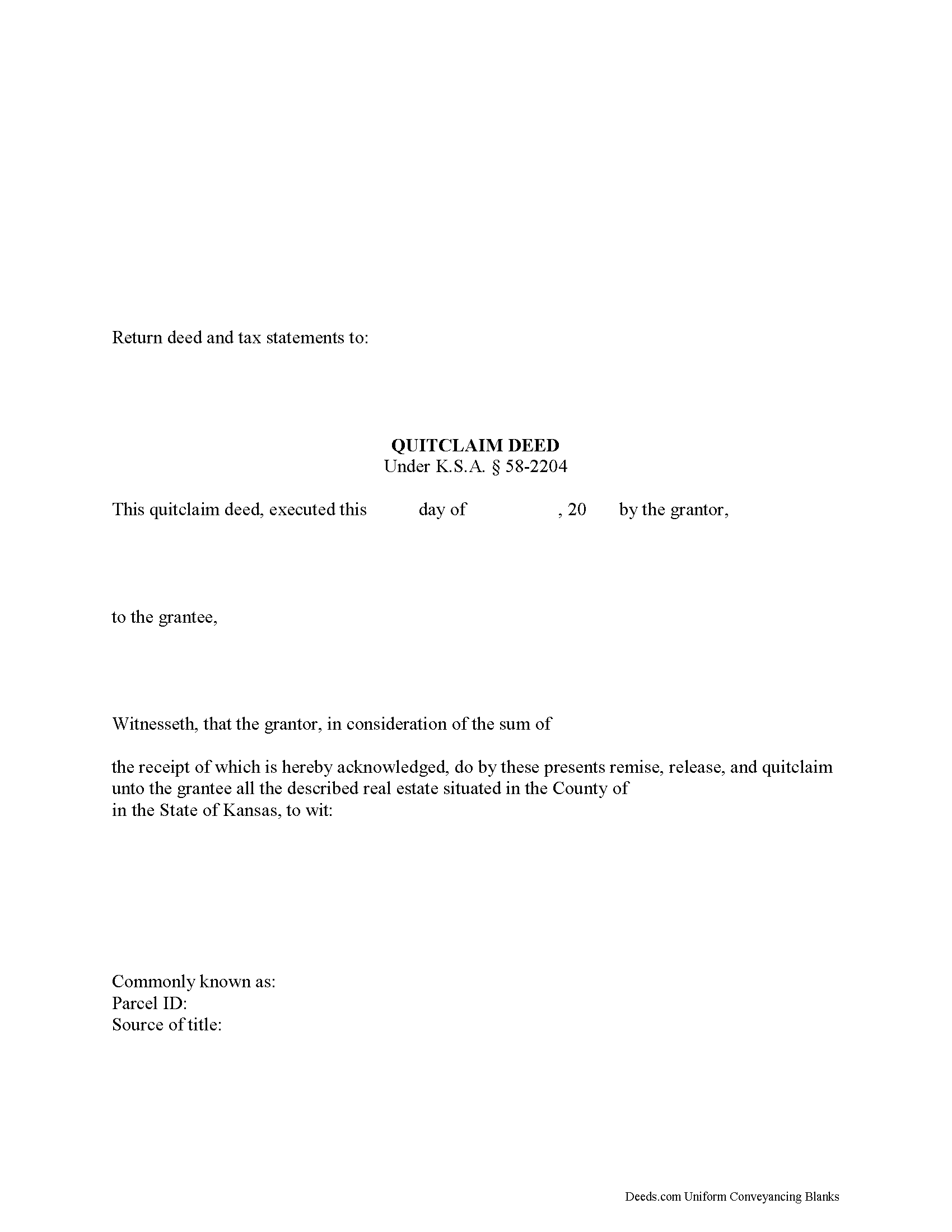
Kansas Quitclaim Deed Content:
K.S.A. 58-2202 explains that "every conveyance of real estate shall pass all the estate of the grantor therein." K.S.A. 58-2202 states that transfers in ownership of land are valid when a deed is executed by someone with an ownership interest in the property. K.S.A. 58-2204 provides the statutory form for quitclaim deeds, including the minimum requirements and correct language. The necessary information includes the names and addresses of all grantors and grantees, a complete legal description of the property, the consideration (usually money), and the notarized signature of the grantor or an authorized representative. K.S.A. 58-2209 reinforces the requirement of the grantor's notarized signature. K.S.A. 58-2211 expands the discussion about who may acknowledge the instrument to include those authorized by uniform law to perform notarial acts. K.S.A. 28-115 states that all signatures must have the signor's name typed or printed immediately below them. Finally, K.S.A. 58-2221 adds the obligation to include details about the transaction in which the grantor gained ownership of the property. In addition, be certain that the document contains an ap... More Information about the Kansas Quitclaim Deed
Gift Deed
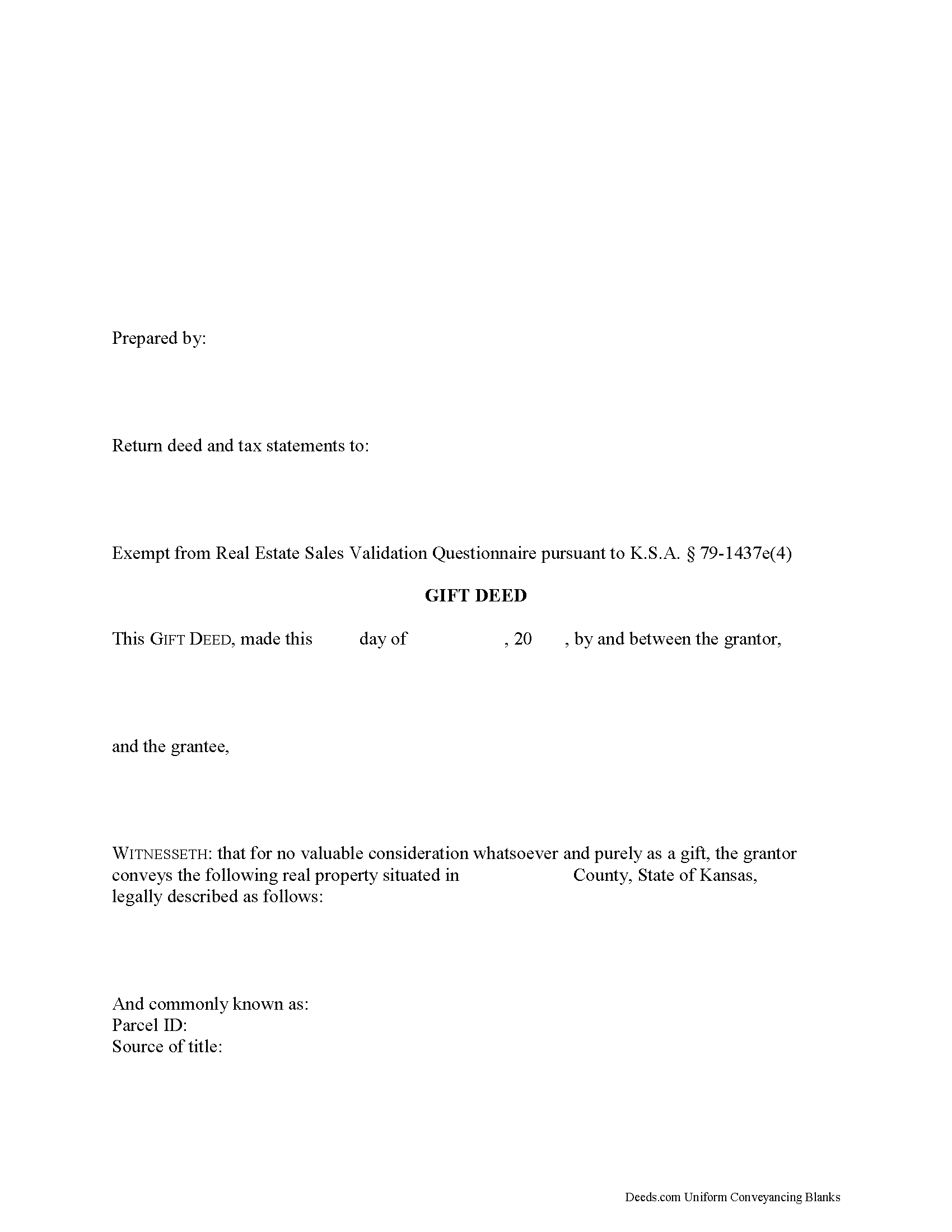
Gift deeds convey title to real property from one party to another with no exchange of consideration, monetary or otherwise. Often used to transfer property between family members or to gift property as a charitable act or donation, these conveyances occur during the grantor's lifetime. Gift deeds must contain language that explicitly states that no consideration is expected or required. Ambiguous language, or references to any type of consideration, can make the gift deed contestable in court.
A lawful gift deed includes the grantor's full name and marital status, as well as the grantee's full name, marital status, vesting information, and mailing address. Vesting describes how the grantee holds title to the property. Generally, real property is owned in either sole ownership or co-ownership. For Kansas residential property, the primary methods for holding title are tenancy in common and joint tenancy. An estate conveyed to two or more persons is considered a tenancy in common, unless a joint tenancy is clearly expressed (K.S.A. 58-501).
As with any conveyance of realty, a gift deed requires a complete legal description of the parcel. Recite the prior deed reference to maint... More Information about the Kansas Gift Deed
Warranty Deed
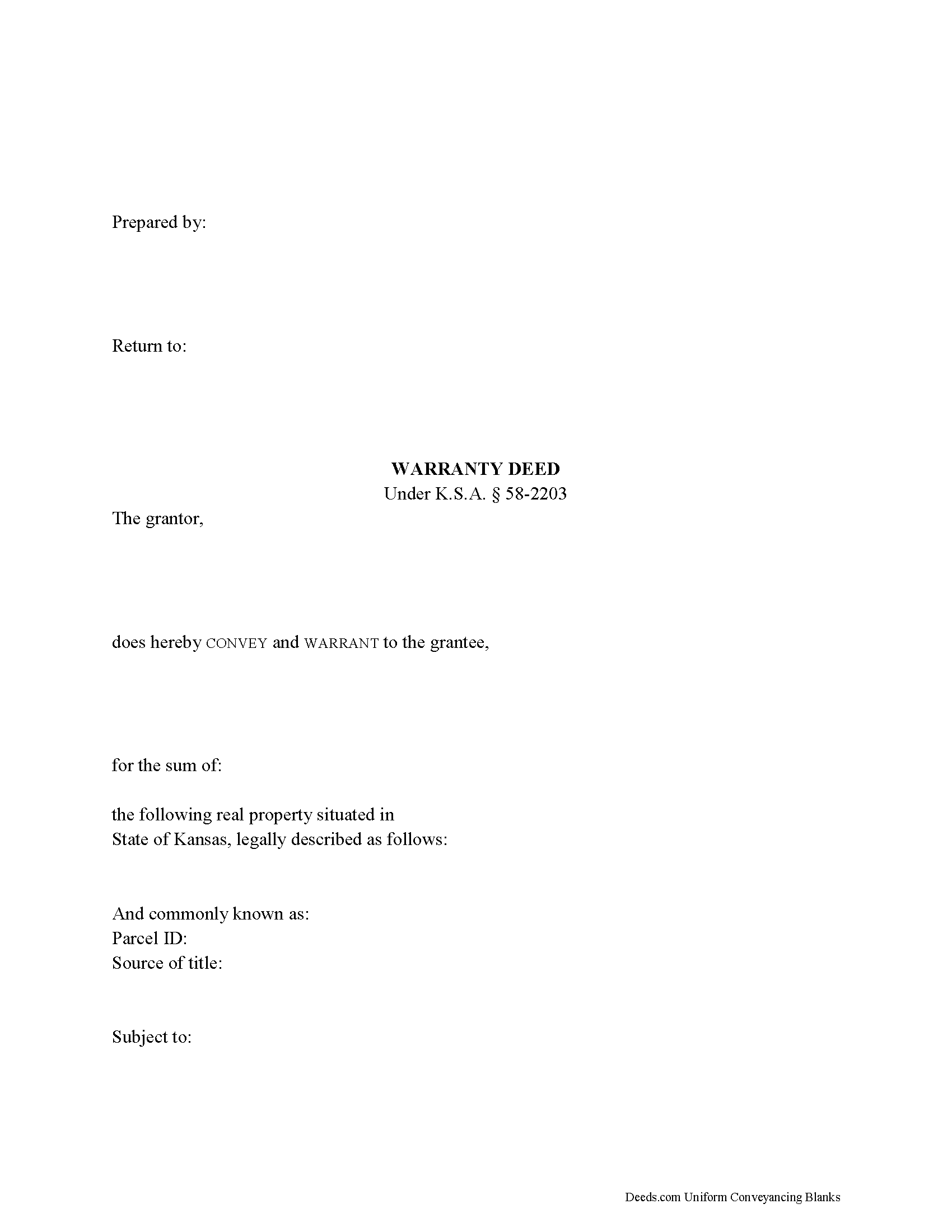
A warranty deed is a legal document used to transfer, or convey, rights in real property from a grantor (seller) to a grantee (buyer). The statutory language for a warranty deed provided in K.S.A. 58-2203 protects the grantee by confirming that the grantor holds clear title to the real estate, has the right to sell the property to the grantee, and he or she will warrant the title against all persons whomsoever. This guarantee extends throughout the property's history. The grantor also warrants that they did not encumber the property in a way prohibiting transfer, and that the deed references all easements, restrictions, or other agreements of record that relate to the specific parcel of land.
A lawful warranty deed includes the grantor's full name and marital status, as well as the grantee's full name, marital status, mailing address, and vesting. Vesting describes how the grantee holds title to the property. For Kansas residential property, the primary methods for holding title in co-ownership are tenancy in common and joint tenancy. A grant of ownership of real estate to two or more persons is presumed to create a tenancy in common, unless otherwise stated (K.S.A. 58-501). As ... More Information about the Kansas Warranty Deed
Special Warranty Deed
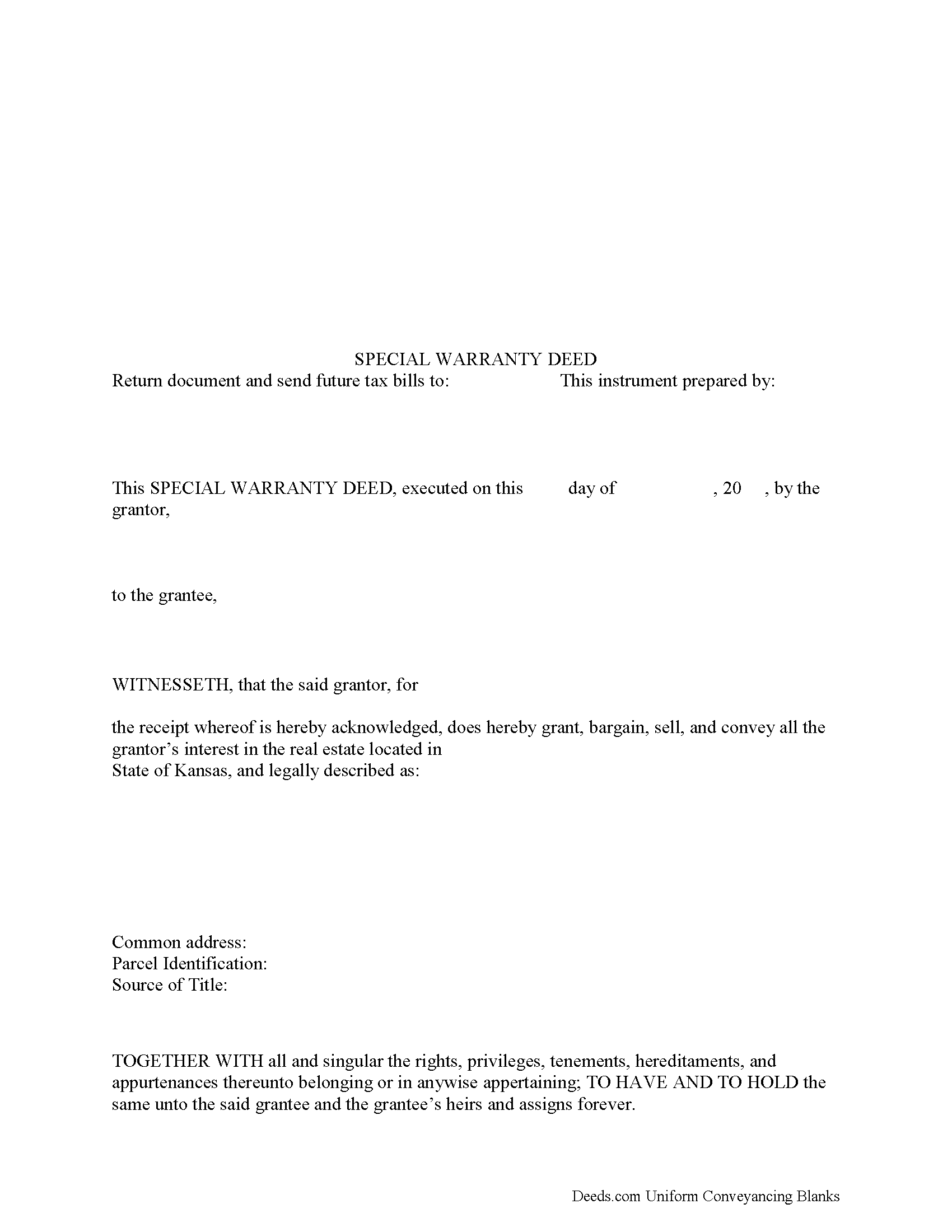
A special warranty deed in Kansas must be in writing, executed by a person having authority to convey the property or by that person's agent, and may be acknowledged or recorded as directed (58-2205). Fiduciaries will often convey real estate by a special warranty deed in Kansas. A special warranty deed contains some of the same covenants as a statutory general warranty deed, but those covenants only pertain to the grantor's period of ownership.
A special warranty deed should be signed by the granting party, or by the grantor's agent or attorney, and may be acknowledged or proved and certified in the manner prescribed by the uniform law on notarial acts (58-2209). A special warranty deed submitted to the register of deeds for recordation must be acknowledged before a person authorized by the uniform law on notarial acts to perform such acts or, if acknowledged within Kansas, by a county clerk, register of deeds, or mayor or clerk of an incorporated city (58-2211). A special warranty deed that has been executed and acknowledged or proved in another state in conformity with the laws of such state or in conformity with the laws of Kansas will be valid as if executed in Kansas (5... More Information about the Kansas Special Warranty Deed
Limited Warranty Deed

A limited warranty deed is a legal document used to transfer, or convey, rights in real property from a grantor (seller) to a grantee (buyer). This type of deed provides significant liability protection for the grantor, and less protection for the buyer. In a limited warranty deed, the grantor only warrants against defects in the title during his or her ownership, and that he or she is authorized to sell the property. However, it does not guarantee freedom from claims on the title originating before the grantor owned the property.
A lawful limited warranty deed includes the grantor's full name and marital status, as well as the grantee's full name, marital status, mailing address, and vesting. Vesting describes how the grantee holds title to the property. For Kansas residential property, the primary methods for holding title in co-ownership are tenancy in common and joint tenancy. A grant of ownership of real estate to two or more persons is presumed to create a tenancy in common, unless otherwise stated (K.S.A. 58-501).
As with any conveyance of real estate, a limited warranty deed must meet all state and local standards for recorded documents. It also requires a complete ... More Information about the Kansas Limited Warranty Deed
Grant Deed

Real estate conveyances in Kansas are governed by Chapter 58, Section 22 of the Kansas Statutes, but the statutes do not specifically address grant deeds.
A grant deed is a legal document used to transfer, or convey, rights in real property from a grantor (seller) to a grantee (buyer). A recorded grant deed imparts notice of this transfer to all persons, including subsequent purchasers or mortgagees (K.S.A. 58-2222).
Within the deed are covenants, or guarantees, that the grantor has not previously sold the real property interest now being conveyed to the grantee, and that the property is being conveyed to the grantee without any liens or encumbrances, except for those specifically disclosed in the deed. Grant deeds do not generally require the grantor to defend title claims.
A lawful grant deed includes the grantor's full name and marital status, as well as the grantee's full name, marital status, mailing address, and vesting. Vesting describes how the grantee holds title to the property. For Kansas residential property, the primary methods for holding title in co-ownership are tenancy in common and joint tenancy. A grant of ownership of real estate to two or more person... More Information about the Kansas Grant Deed
Correction Deed
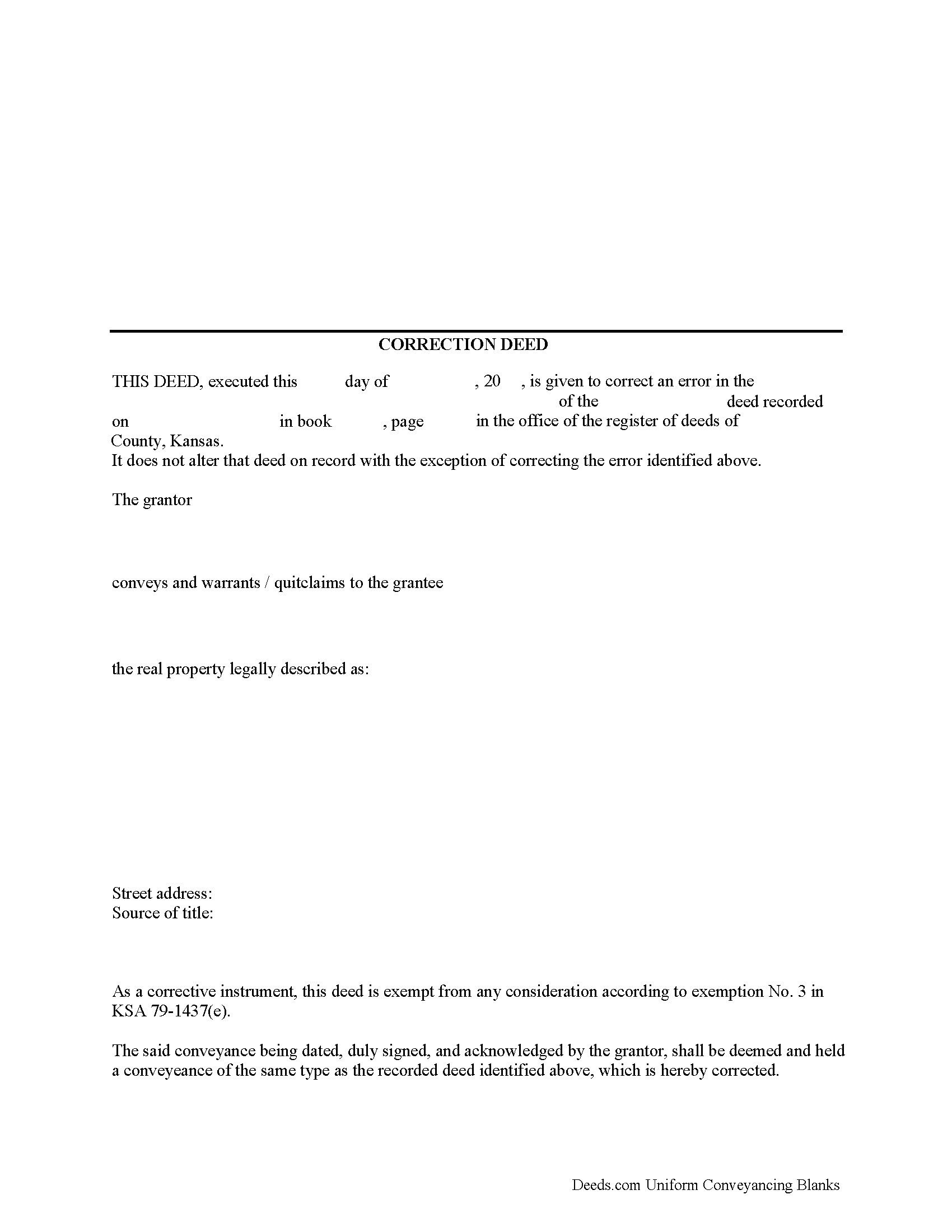
In Kansas, the correction deed is the most widely accepted instrument used to correct an error in a recorded deed.
Many counties require, or at least prefer, the filing of a correction deed when making any corrections to the original instrument. It can be used to correct a typographical or other minor error, for example in the names of the grantor or grantee, their marital status or type of vesting, or in the legal description or any other information about the property. Although some counties accept a re-file affidavit when correcting and re-recording a deed, executing a correction or corrective deed is the more common method and guarantees that the state's legibility requirements are met (KSA 28-115(e)). The correction deed must make reference to the earlier deed that has already been recorded by date and instrument number and needs to indicate its exemption status from resubmitting the Kansas Sales Validation Questionnaire (KSA 79-1437(e)). As is required with any deed submitted for recording in Kansas, a new address for tax statements must be furnished with the new deed (KSA 58-2221).
To make more significant changes, such as changing the way title is held (e.g. as joint ... More Information about the Kansas Correction Deed
Easement Deed
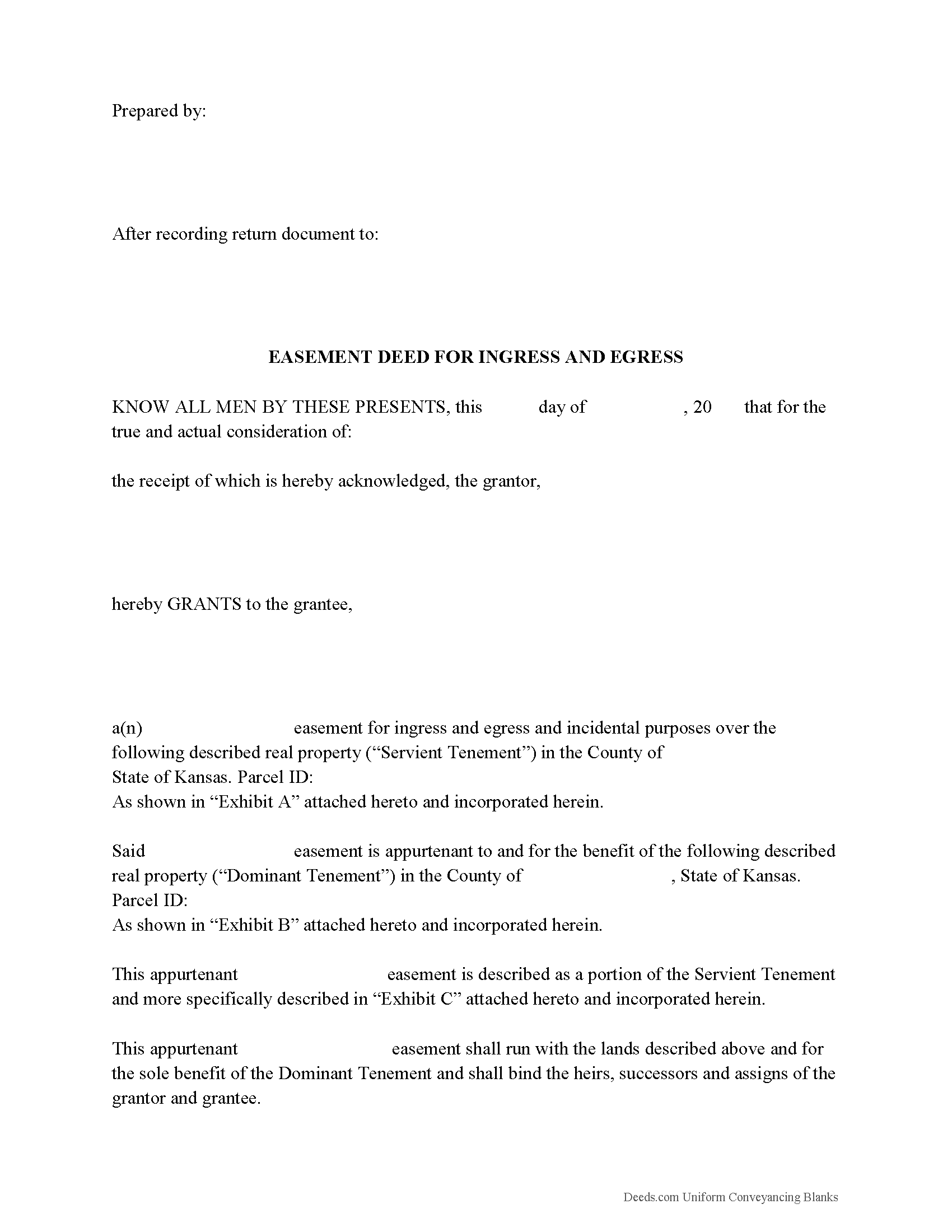
An easement is the non-possessory and non-ownership right of one person to use the real property of another person for a specific use. The specific instrument that creates such right is the easement deed. An easement deed in Kansas can be created for a variety of purposes: rights of way, access points, solar easements, and so on. Easements can be created by deed, by necessity, or by order of law.
Every instrument that conveys any estate or interest created by any lease or easement involving wind or solar resources and technologies to produce and generate electricity should include the requirements listed in section 58-2272 of the Kansas Annotated Statutes. Conservation easements are defined in 58-3810 of the Kansas Annotated Statutes. Easement deeds are subject to the recording and conveying rules of other real property instruments.
As a real property instrument, an easement deed must be signed and acknowledged by the grantor or by the grantor's agent or attorney in accordance with the uniform law on notarial acts and with KSA 58-2216 (58-2209). An easement deed should be acknowledged before a person authorized by the uniform law on notarial acts to perform notarial acts, o... More Information about the Kansas Easement Deed
Termination, Cancellation of Easement / Right of Way
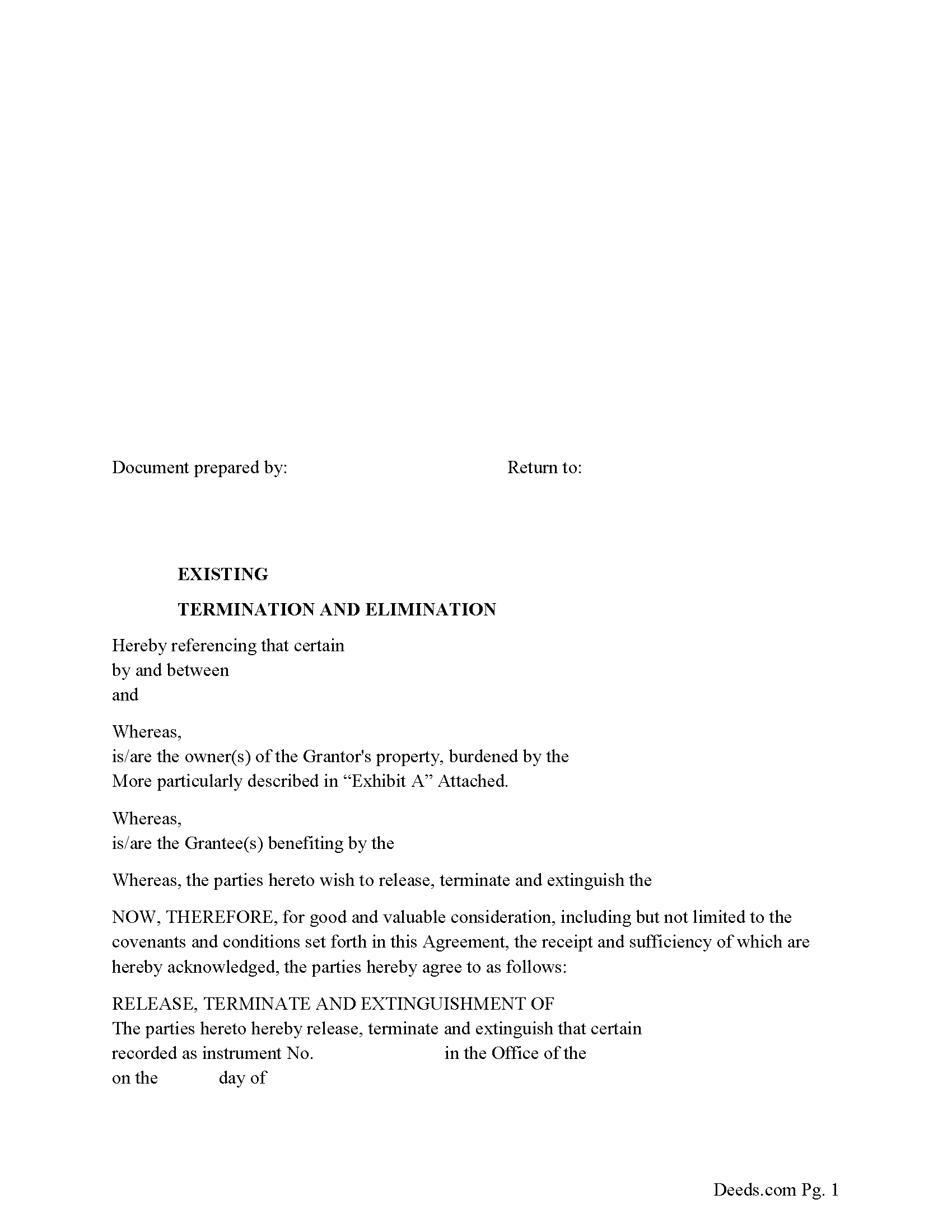
Use this form to release, terminate, extinguish a previously recorded document that involves access to and from a property.
Documents such as:
1. Easement Deeds or Agreements (An easement is a non-possessory interest in land, granting the right to use someone else's property for a specific purpose, like a driveway or utility line)
2. Access Roads
3. Right of Ways
4. Utility Easements (Power, Gas, Water, Sewer, Etc.)
5. Drainage Easements
This document allows the owner of the land, burdened by the access and the party that benefits from the access, to sign an agreement releasing the property from such access, ... More Information about the Kansas Termination, Cancellation of Easement / Right of Way
Mineral Deed
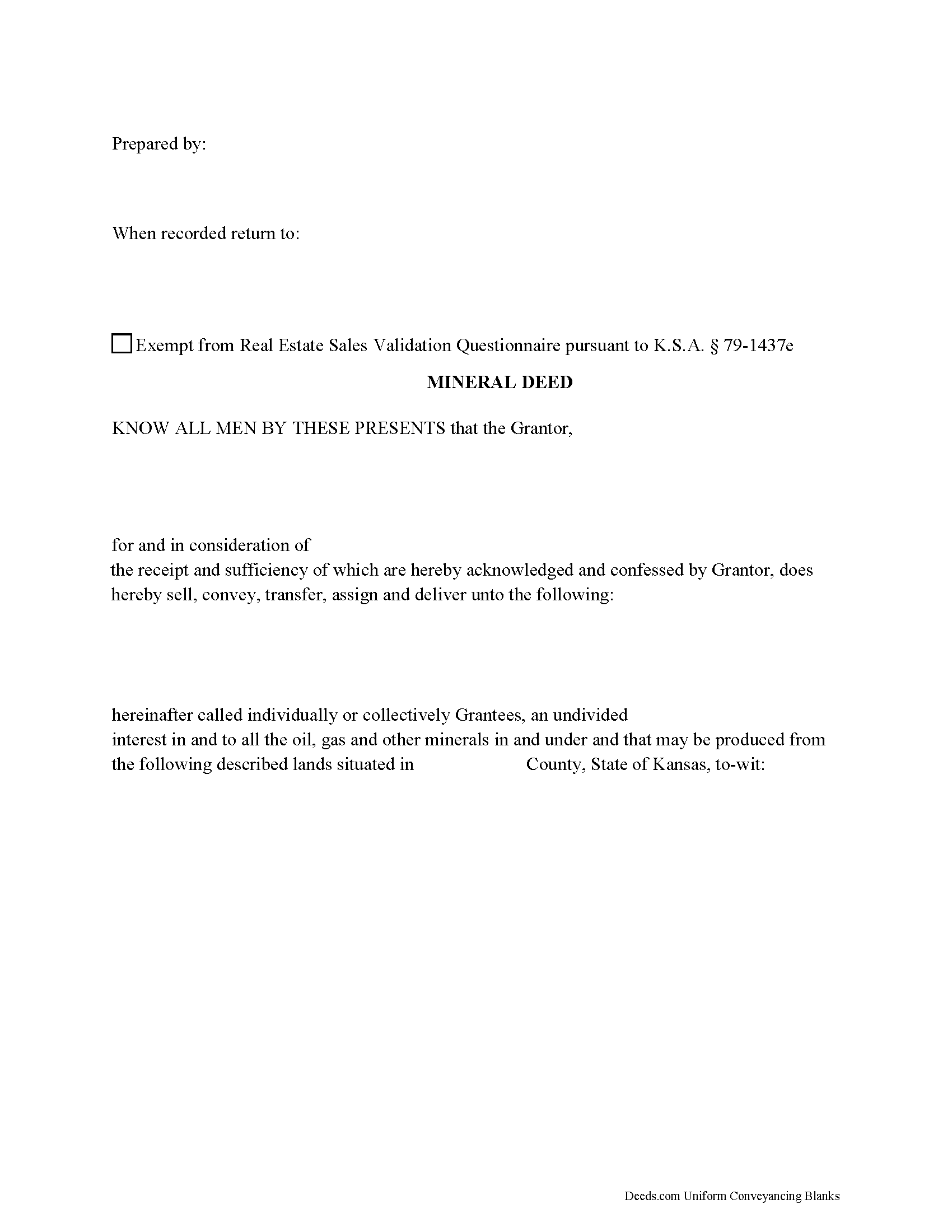
The General Mineral Deed in Kansas transfers oil, gas, and mineral rights from the grantor to the grantee. THIS IS NOT A LEASE. There are no Exceptions or Reservations included.
The transfer includes the oil, gas and other minerals of every kind and nature. It also transfers any and all rights to receive royalties, overriding royalties, net profits interests or other payments out of or with respect to those oil, gas and other minerals. The Grantor can stipulate the percentage of Mineral Rights the Grantee will receive and is made subject to any rights existing under any valid and subsisting oil and gas lease or leases of record.
This general mineral deed gives the grantee the right to access, for the purpose of mining, drilling, exploring, operating and developing said lands for oil, gas, and other minerals, and storing handling, transporting and marketing of such.
In this document the Grantor Warrants and will defend said Title to Grantee. Use of this document has a permanent effect on your rights to the property, if you are not completely sure of what you are executing seek the advice of a legal professional.
(Kansas Mineral Deed Package includes form, guidelines, and... More Information about the Kansas Mineral Deed
Mineral Deed with Quitclaim Covenants
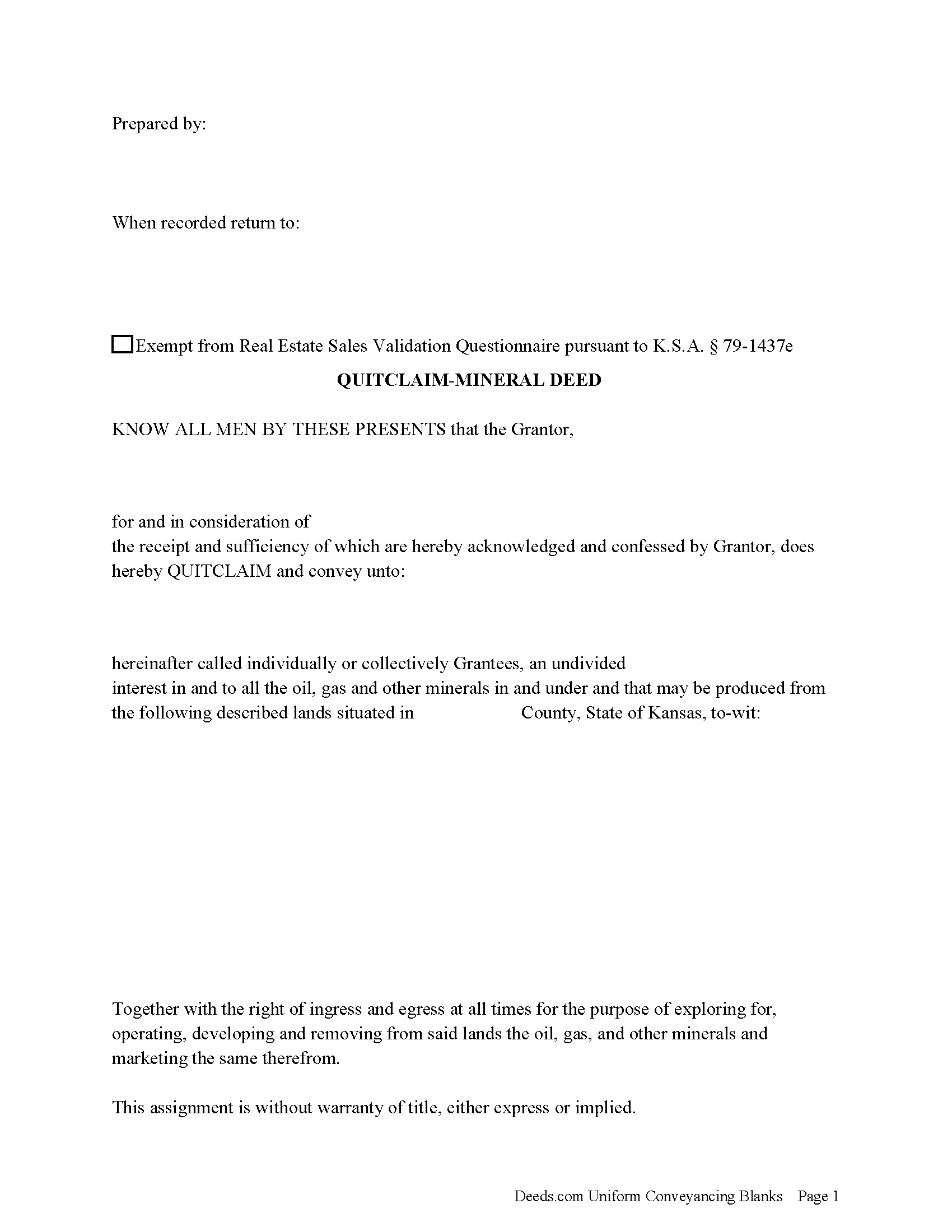
The General Mineral Deed in Kansas Quitclaims oil, gas, and mineral rights from the grantor to the grantee. THIS IS NOT A LEASE. There are no Exceptions or Reservations included.
The transfer includes the oil, gas and other minerals of every kind and nature. The Grantor can stipulate the percentage of Mineral Rights the Grantee will receive.
This general mineral deed gives the grantee the right to access, for the purpose of mining, drilling, exploring, operating and developing said lands for oil, gas, and other minerals, and storing handling, transporting and marketing of such.
The seller, or grantor Quitclaims the mineral rights and does NOT accept responsibility to any discrepancy of title (This assignment is without warranty of title, either express or implied)
Uses: Mineral deeds with quitclaim are often used in situations where the grantor wants to quickly release any interest they might have in mineral rights, such as in settling estates, resolving disputes, clearing up uncertainties about ownership in a title's history or when mineral rights have previously been severed or fragmented from surface rights and cloud a title, making it difficult to transfer property.... More Information about the Kansas Mineral Deed with Quitclaim Covenants
Limited Power of Attorney for Sale
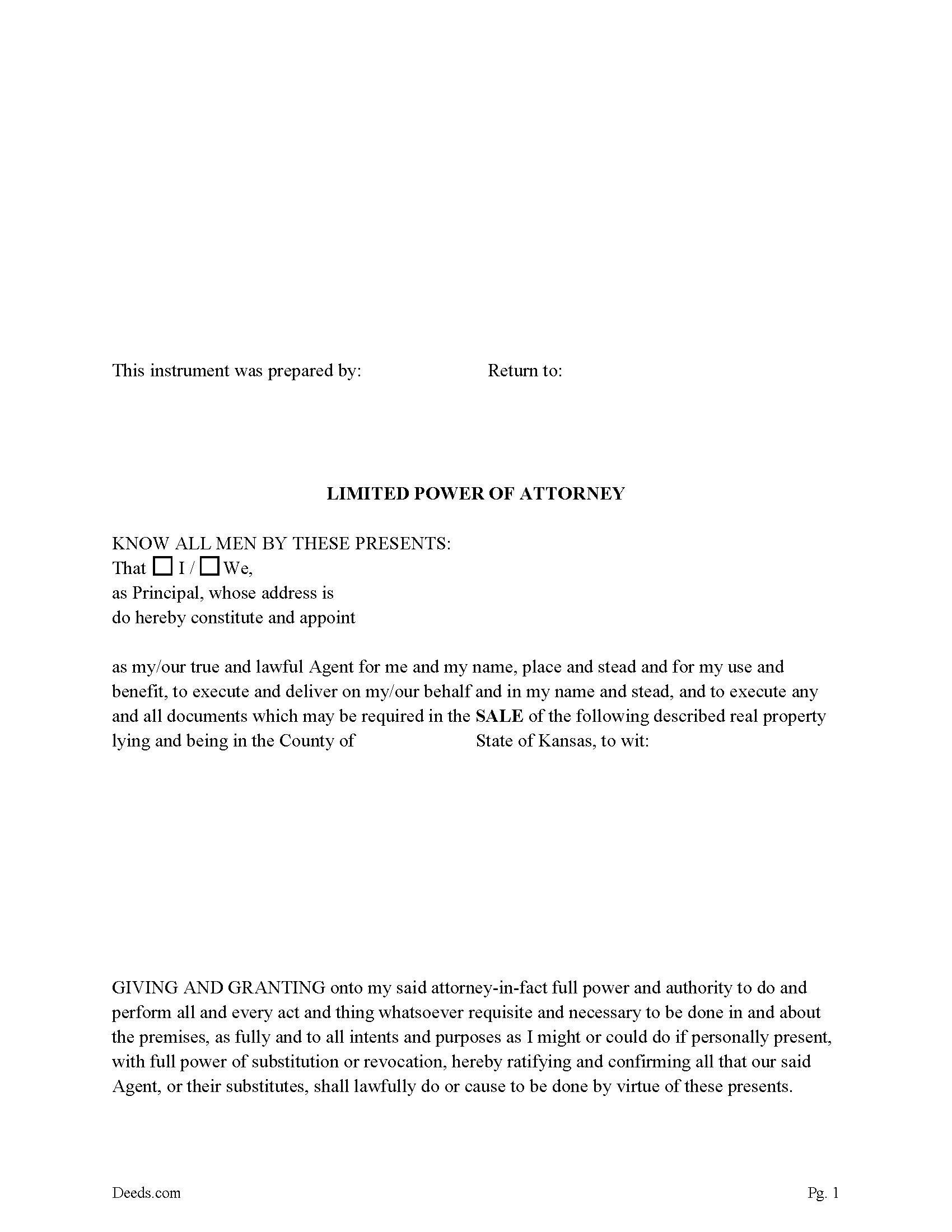
In Kansas, a Limited Power of Attorney (LPOA) for the sale of real estate is a legal document that grants a designated person (the agent or attorney-in-fact) the authority to handle specific matters related to the sale of real property on behalf of the principal (the person granting the power). This power can include signing documents, handling transactions, and making decisions related to the sale. However, the statutes and legal requirements can be complex and are subject to change, so it's important to consult a legal professional for the most current and applicable advice.
General guidelines regarding a Limited Power of Attorney for real estate in Kansas:
Written Document: The power of attorney must be in writing. It should clearly state the principal's name, the agent's name, and the specific powers granted.
Durability: This document shall continue in effect during any subsequent disability, incompetency, or incapacity of the principal in accordance with the provisions of K.S.A. 58-650, et al.,
Acknowledgment: The document typically needs to be signed by the principal and should be notarized. This is particularly important for real estate transactions, as a notariz... More Information about the Kansas Limited Power of Attorney for Sale
Limited Power of Attorney for Purchase
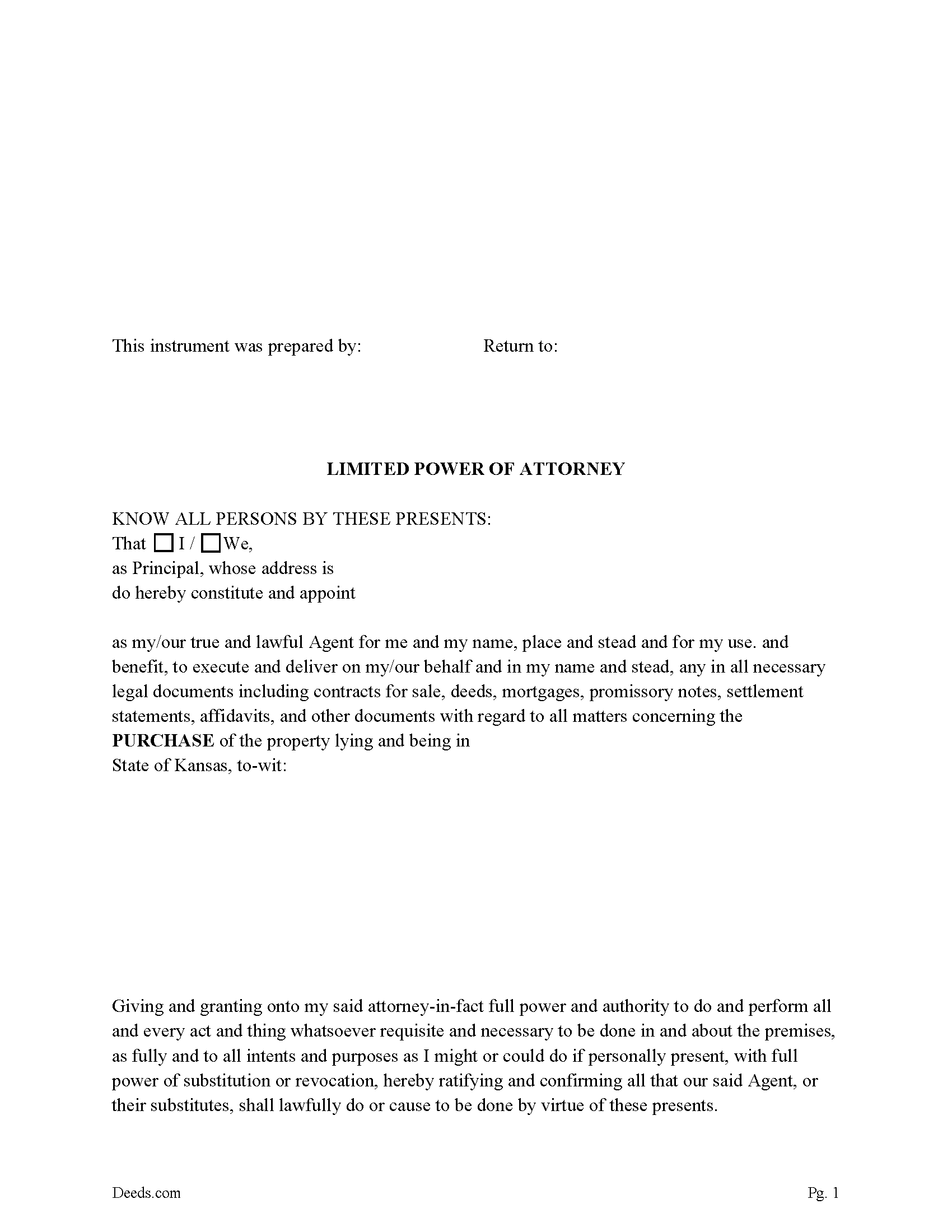
A Kansas Limited Power of Attorney for Purchase is a legal document that grants an individual, referred to as the "principal," the authority to appoint someone else, known as the "agent" or "attorney-in-fact," to act on their behalf in specific purchase-related matters within the state of Kansas.
This document is governed by Kansas statutes, primarily under the Kansas Uniform Power of Attorney Act, which can be found in the Kansas Statutes Annotated (K.S.A.) Chapter 58, Article 6a.
This document is designed to protect the interests of the principal by ensuring that the agent only exercises the powers explicitly granted and does not have a broad or unrestricted authority. It is a useful tool when the principal cannot personally attend to specific purchases or transactions in Kansas and needs a trusted representative to act on their behalf within the limits specified in the document.
General description of the key elements and uses of a Kansas Limited Power of Attorney for Purchase:
Parties involved:
Principal: The person granting the limited power of attorney, typically an individual who wants to authorize someone to make specific purchases on their behalf.
Agent: Th... More Information about the Kansas Limited Power of Attorney for Purchase
Contract for Deed
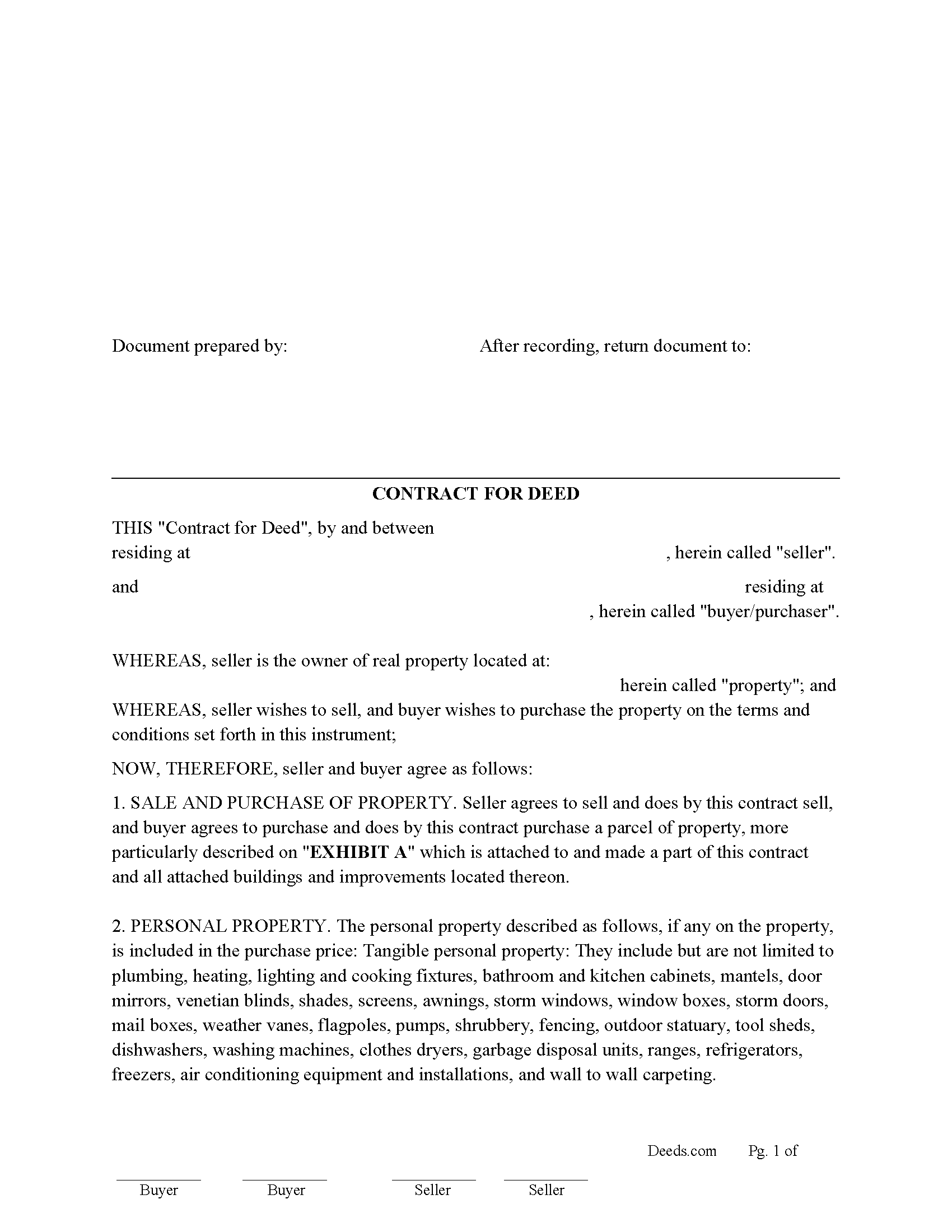
A "Contract for Deed," sometimes referred to as a Land Contract is a legal agreement in which the buyer of a property agrees to pay the seller the purchase price over a period of time. During this period, the buyer has possession of the property, but the seller retains legal title to the property until the full purchase price is paid.
Recording the Contract: In Kansas, it's usually a good idea to record the contract for deed or an Affidavit of Equitable Interest with the county register of deeds. This ensures public notice of the buyer's interest in the property and protects against subsequent claims.
Foreclosure Process: If the buyer defaults on a contract for deed, the seller may need to go through a judicial foreclosure process to regain possession of the property. Kansas law will specify the procedure, notice requirements, and redemption rights.
Equitable Title: Under a contract for deed, the buyer often holds equitable title to the property, meaning they have a right to obtain full legal title once the contract terms are fulfilled. However, until then, the legal title remains with the seller.
Rights and Obligations: The contract should clearly outline the rights an... More Information about the Kansas Contract for Deed
Affidavit for Equitable Interest
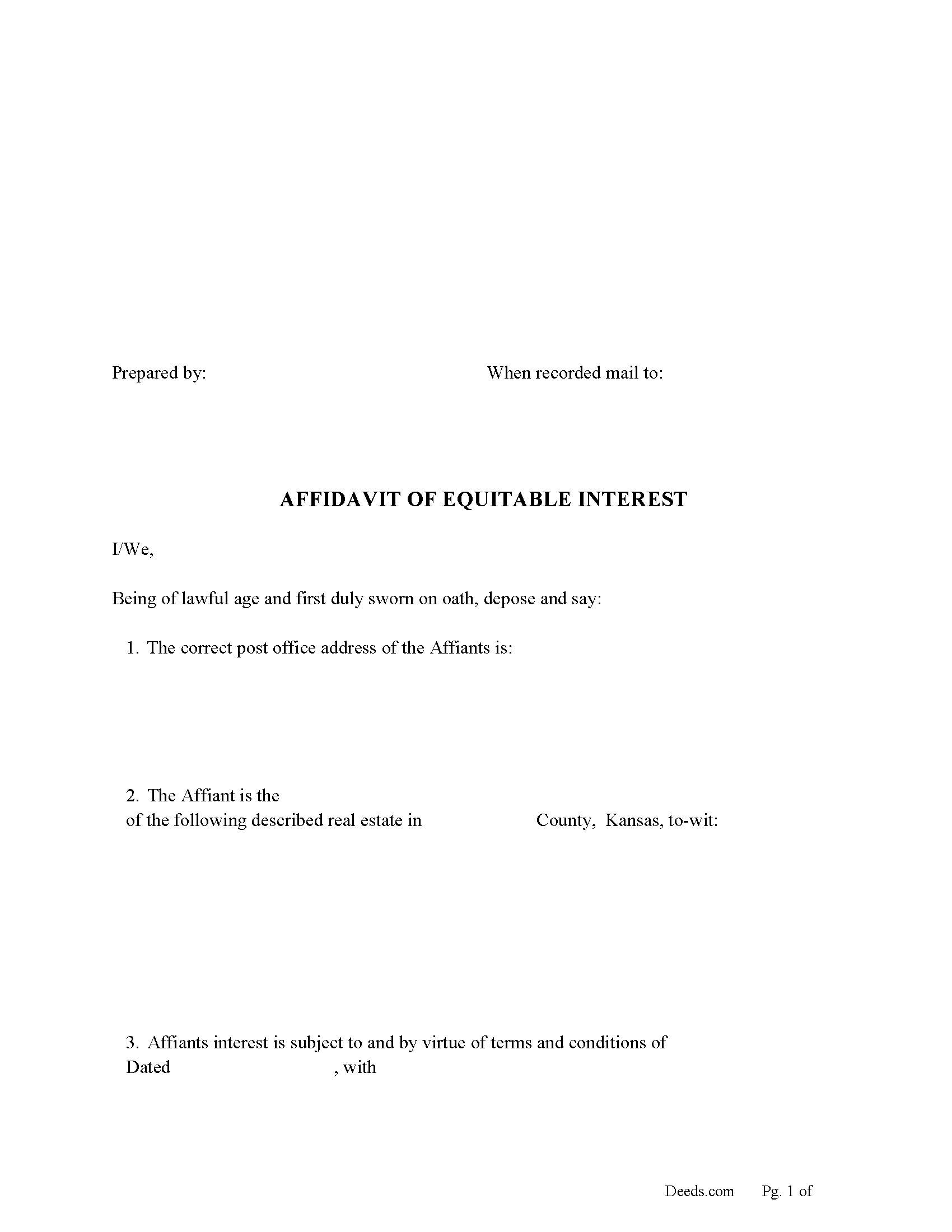
In Kansas, as in other jurisdictions, an "Affidavit of Equitable Interest" is a legal document used in real estate transactions to declare the equitable interest of a party in a property. Equitable interest is a type of interest in real estate that indicates a beneficial interest in the property and may arise from a contract, such as a contract for deed, purchase agreement, etc. even though the legal title has not yet been transferred. An affidavit of this type can be filed by either party to the contract, and is often filed by purchasers alone.
Here's a breakdown of what an Affidavit of Equitable Interest typically involves:
1. Declaration of Interest: The affidavit is a sworn statement declaring that the affiant (the person making the affidavit) has an equitable interest in a specific piece of real estate. This interest usually stems from a contractual agreement, like a contract for deed, lease-purchase agreement, or an agreement for deed.
2. Use in Real Estate Transactions: This affidavit is often used in situations where a party needs to prove their interest in a property, but the legal title has not been transferred to them. It can be important in cases where the prop... More Information about the Kansas Affidavit for Equitable Interest
Mortgage Instrument and Promissory Note
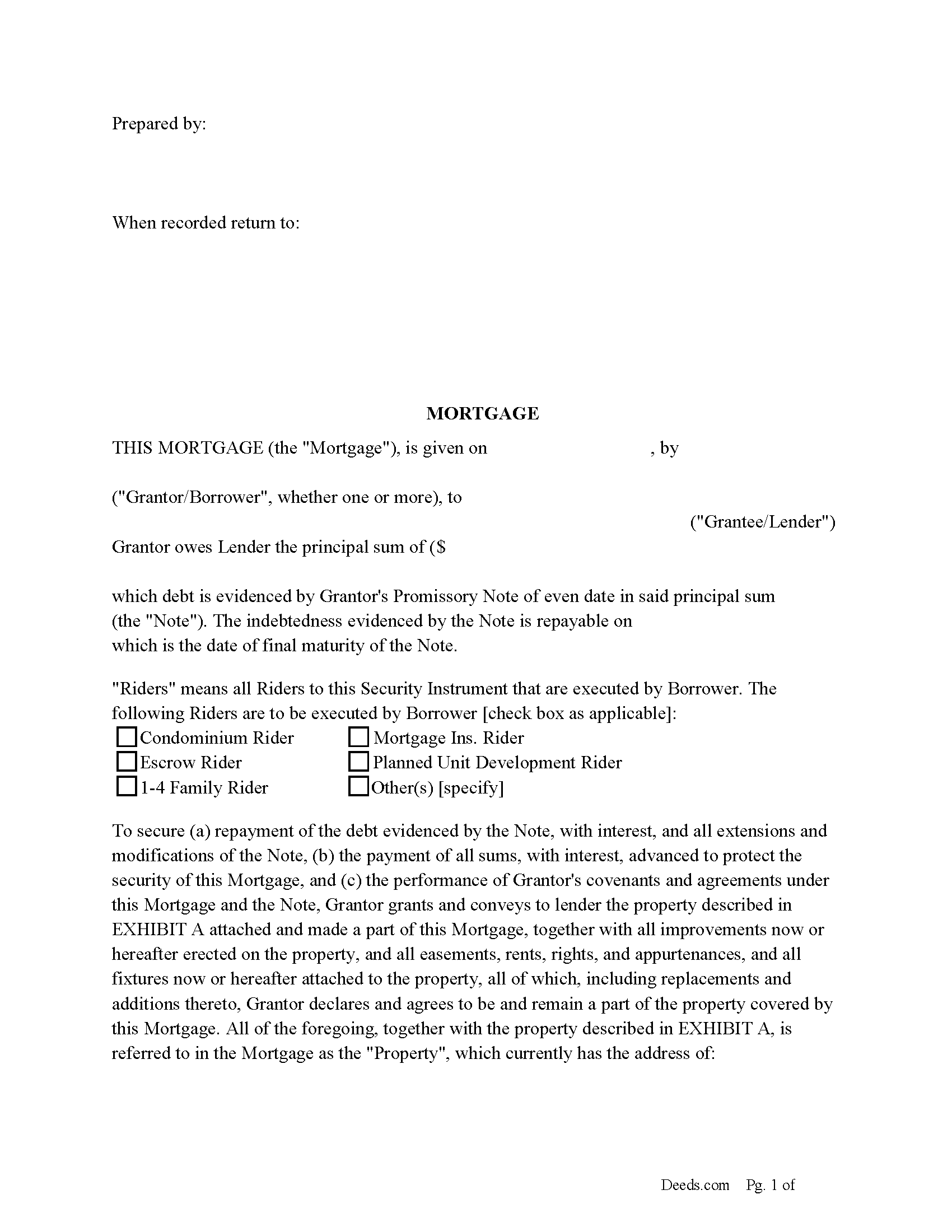
In this mortgage the grantor/borrower "Warrants" title to grantee/lender (the said mortgage being dated, and duly signed and acknowledged by the grantor, shall be deemed and held to be a good and sufficient mortgage to the grantee, his or her heirs, assigns, executors and administrators, with warranty from the grantor and his or her legal representatives of a perfect title in the grantor, and against all previous encumbrances; and if in the above form the words "and warrants" be omitted, the mortgage shall be good without warranty. (KS Statute 58-2303)
Use this form to finance residential property, vacant land, rental property, condominiums, small commercial property and planned unit developments. For use in Kansas only.
(Kansas Mortgage Package includes forms, guidelines, and completed examples)
... More Information about the Kansas Mortgage Instrument and Promissory Note
Discharge of Mortgage
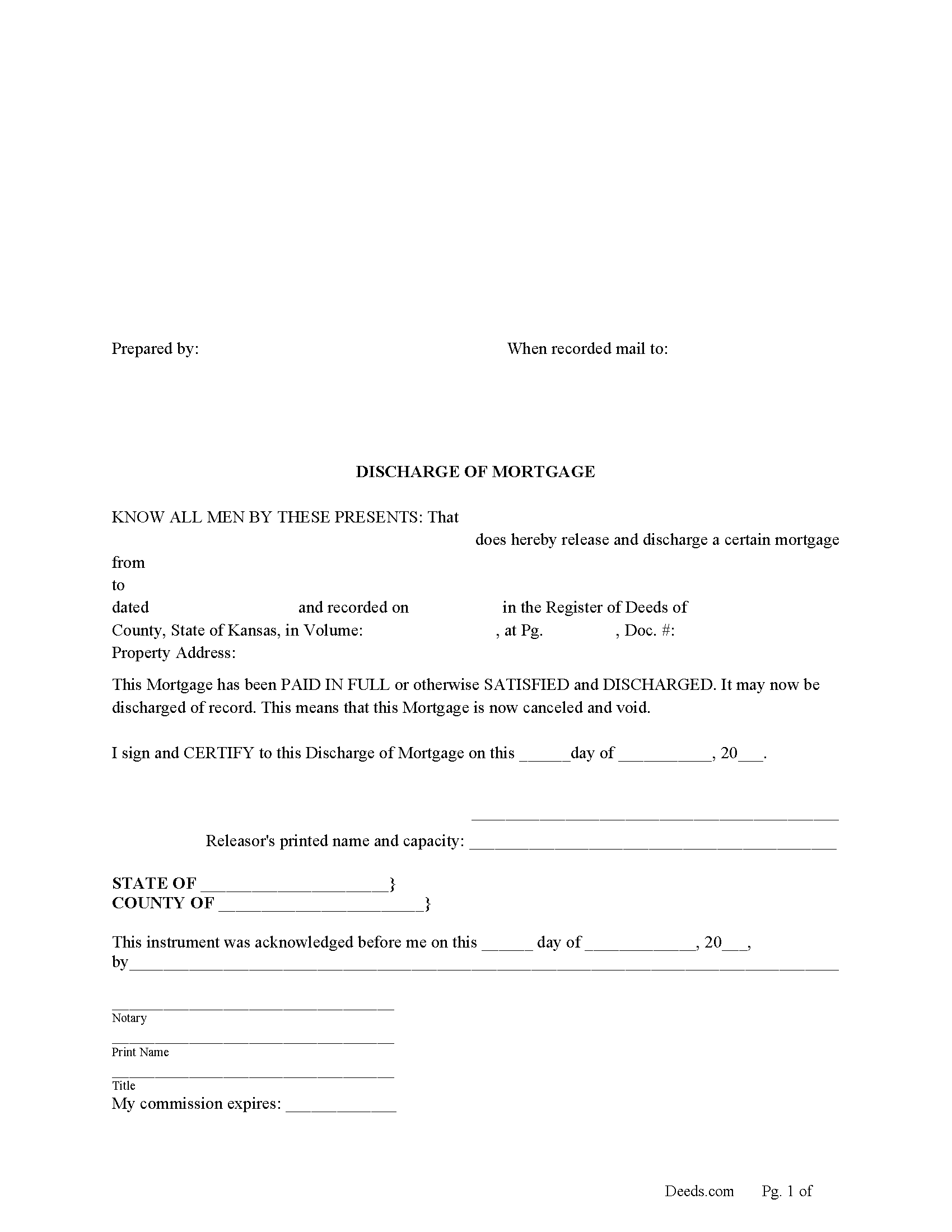
It is the duty of the mortgagee/lender or assignee of mortgage to perform an entry of satisfaction, (When the indebtedness secured by a recorded mortgage is paid and there is no agreement for the making of future advances to be secured by the mortgage, the mortgagee or the mortgagee's assignee shall enter satisfaction or cause satisfaction of such mortgage to be entered of record forthwith, paying the required fee.) (58-2309a)
A mortgagee/lender generally has 20 days in which to record a discharge once notified, (damages to the person for whom the demand was made in the sum of $500, together with a reasonable attorney's fee for preparing and prosecuting the action. The plaintiff in such action may recover any additional damages that the evidence in the case warrants. Civil actions may be brought under this act before any court of competent jurisdiction, and attachments may be had as in other cases.) (58-2309(d))
(Kansas Discharge of Mortgage Package includes form, guidelines, and completed example) For use in Kansas only.
... More Information about the Kansas Discharge of Mortgage
Assignment of Mortgage
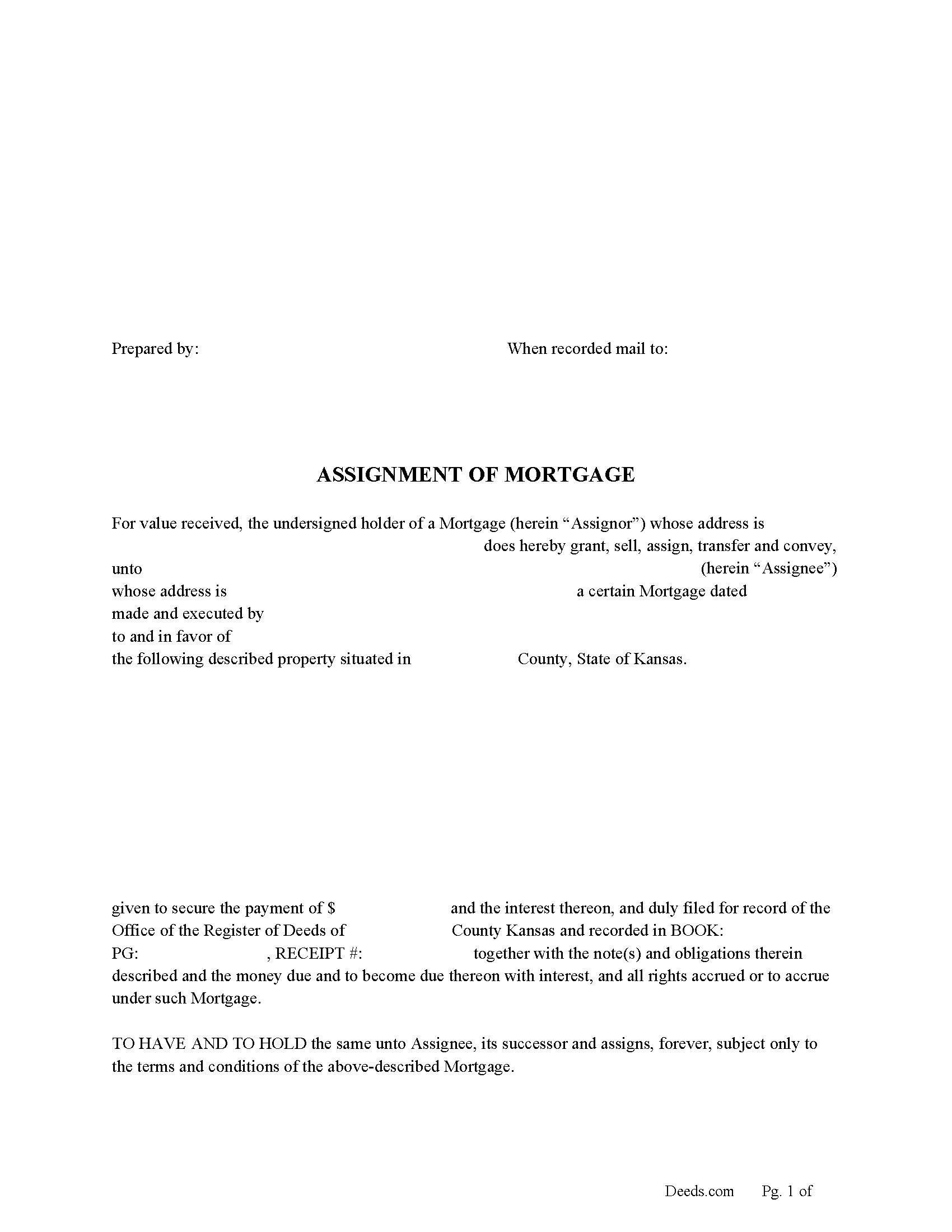
Use this assignment to assign a current mortgage to another entity. This is usually done when the mortgage has been sold.
Any mortgage of real property that has been or may hereafter be recorded shall be assigned by an instrument acknowledging the assignment of such mortgage. , (signed by the mortgagee or such mortgagee's duly authorized attorney in fact, assignee of record, personal representative or by the lender or a designated closing agent acting as a closing agent in the sale, financing or refinancing of the real estate subject to such mortgage who has caused the indebtedness to be paid in full upon compliance with K.S.A. 58-2309a, and amendments thereto, and duly acknowledged and certified as other instruments affecting real estate. Such instrument shall contain the name of the mortgagor and mortgagee, a legal description of the property and the volume and page in which the mortgage is recorded.)(58-2306(a))
Where the mortgagee or assignee of record is a firm or partnership, such mortgage shall be assigned or discharged by an instrument acknowledging the assignment or satisfaction of such mortgage as hereinbefore provided. Such instrument shall be signed either by each... More Information about the Kansas Assignment of Mortgage
Assignment of Leases and Rents
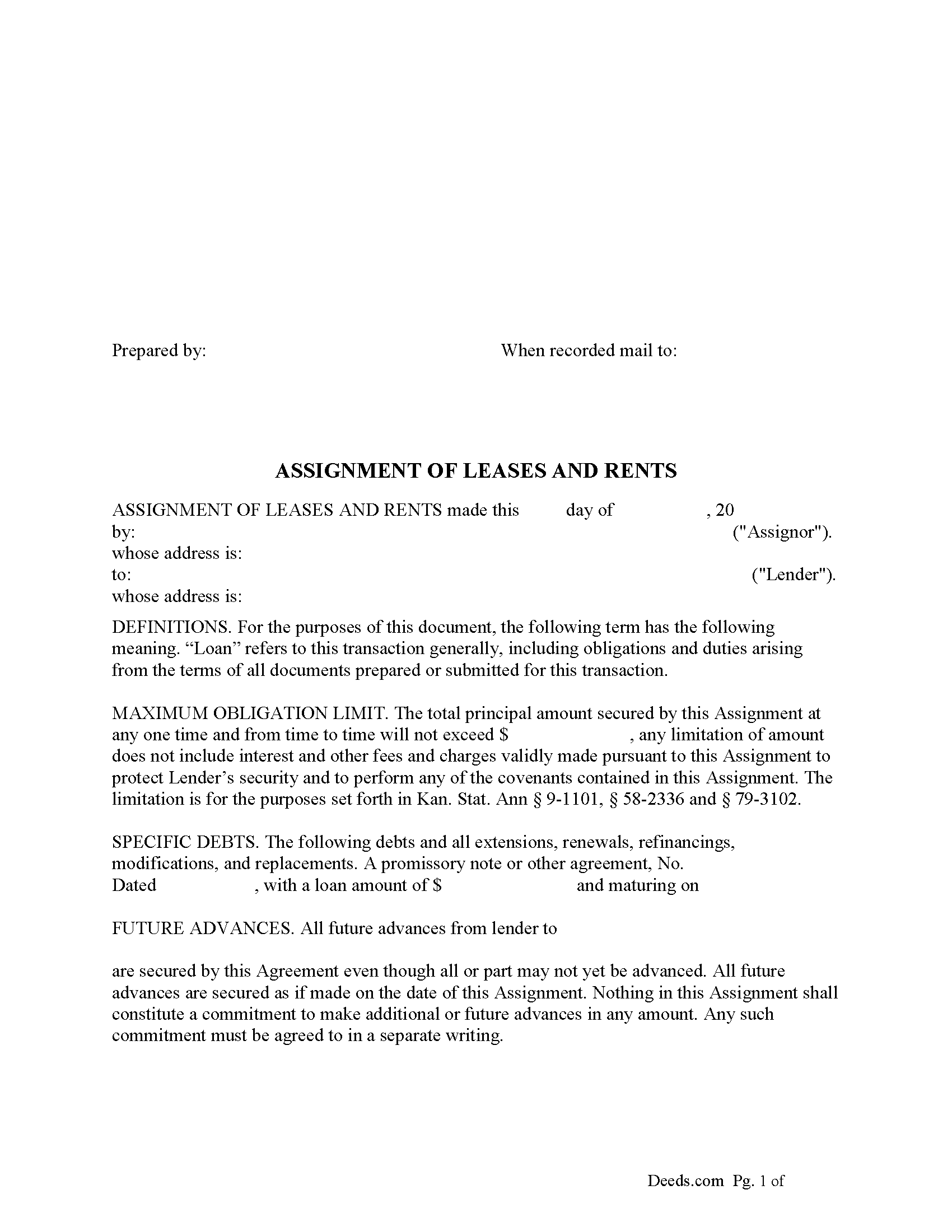
When a loan is given on property that has rental income, an assignment of leases and rents is often used to protect the lender in the case of default. This form allows the lender to collect rents and other sums due under leases, authorizes lessees to pay the lender, allows lender to take possession of property at lenders option, etc. Without an "Assignment of Leases and Rents" borrowers in default could collect rents while not making payments to the lender and for this reason, borrowers will use it to induce lenders to make a loan.
(Kansas Assignment of Leases and Rents Package includes form, guidelines, and completed example) For use in Kansas only.
... More Information about the Kansas Assignment of Leases and Rents
Release of Assignment of Leases and Rents
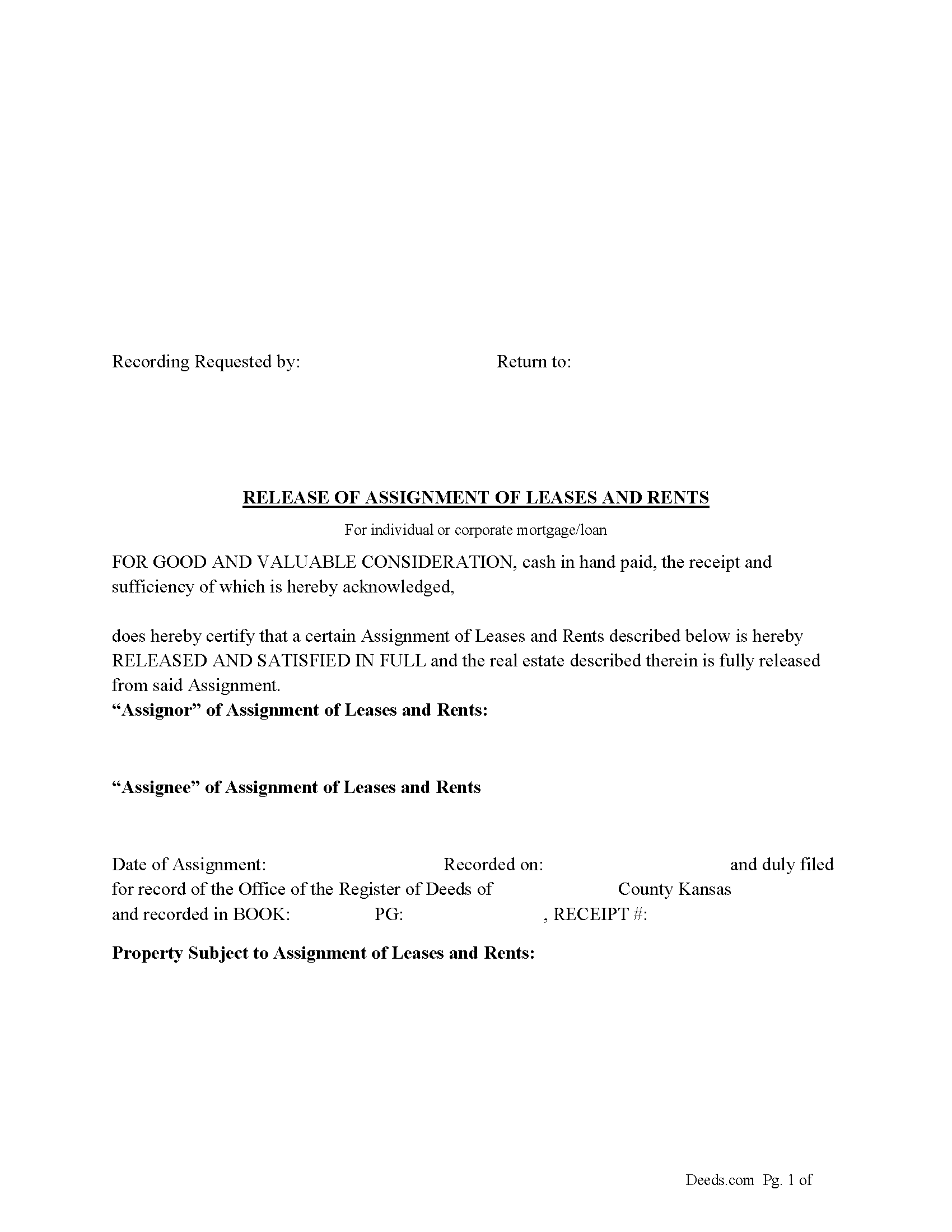
The "Release of Assignment of Leases and Rents" is a legal document used to relinquish the interest of the assignee in the rents and leases of a property, often when the associated loan or mortgage is fully paid off. In the context of Kansas real estate, the document would typically include:
Title: Clearly stated as "Release of Assignment of Leases and Rents" to indicate its purpose.
Introductory Clause: Identifying the document as a release to an earlier "Assignment of Leases and Rents," referencing the original document by date and possibly by the book and page number where it was recorded.
Identification of Parties: Names and addresses of the assignor (the current holder of the mortgage or beneficiary) and the assignee (the party to whom the rents and leases were originally assigned).
Description of Real Estate: Legal description of the property in question, which may include the street address, legal description used in public records, and any identifying parcel numbers.
Declaration of Satisfaction: A statement that the mortgage or obligation which prompted the assignment of rents and leases has been fully satisfied or paid in full.
Execution by Holder: Signat... More Information about the Kansas Release of Assignment of Leases and Rents
Memorandum of Lease
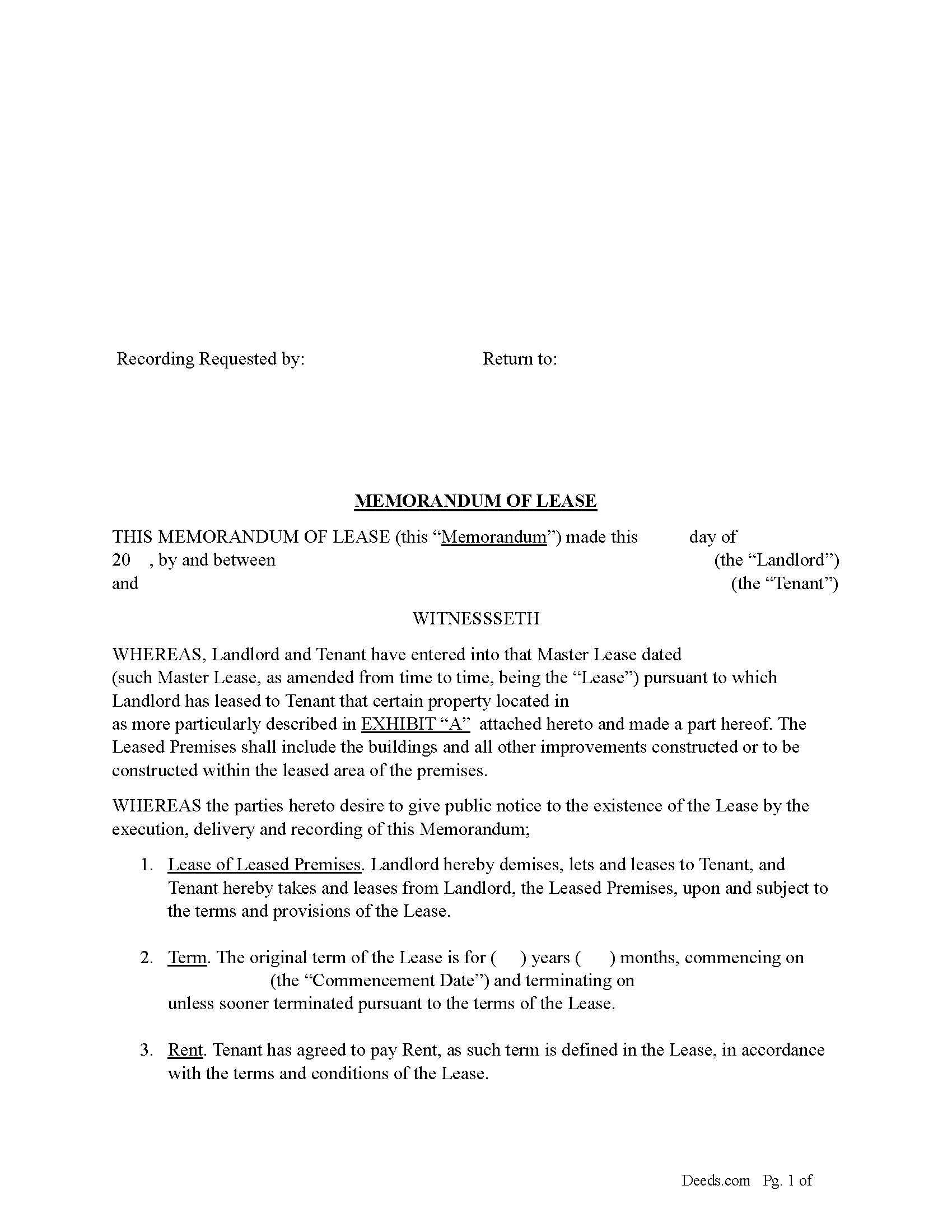
A Kansas Memorandum of Lease is a document recorded to provide notice of a lease agreement's existence. According to Kansas Statute 58-2221, it can convey an estate or interest created by an oil and gas lease, or any lease or easement involving wind resources for electricity generation. It must be recorded with the Register of Deeds in the county where the property is situated and must include the full names and addresses of the parties involved. The register is responsible for immediate recording and checking for errors against previous transfer records.
The statutes 58-2501 to 58-2510 in Kansas law collectively establish the legal framework for lease agreements and their termination. They dictate the terms under which leases can exist (58-2501), including the rights tenants have concerning property improvements (58-2501a), define annual tenancies (58-2502), set out how and when rent is to be paid (58-2503), and provide procedures for terminating leases, whether at will (58-2504), yearly (58-2505), or for farm or pastureland (58-2506, 58-2506a). Additionally, they specify the notice requirements for ending leases of different durations (58-2507, 58-2508), circumstances where no... More Information about the Kansas Memorandum of Lease
Transfer on Death Deed
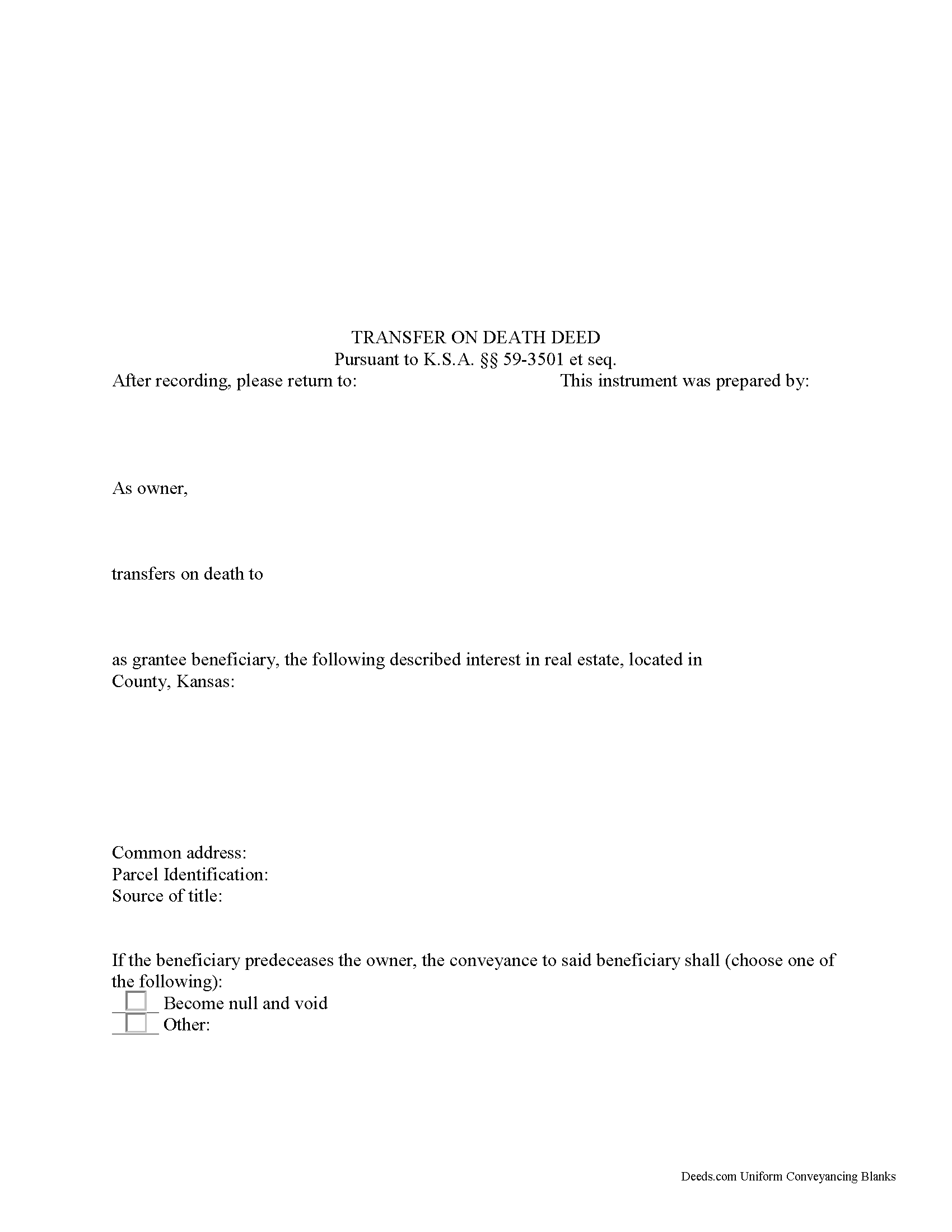
Kansas enacted its statutory transfer on death deeds in 1997. These nontestamentary, nonprobate conveyances are governed by K.S.A. 59-3501 (2012) et seq. Nontestamentary means that the transfer is not included in or affected by the owner's last will and testament. Nonprobate means that the property's change in title occurs outside the probate process.
Transfer on death deeds, when lawfully executed and RECORDED DURING THE OWNER'S LIFE, convey a land owner's interest in a specific piece of real property to a designated beneficiary after the owner dies. Until death, the owner retains absolute rights to and control over the property, including entering into agreements to rent, mortgage, or sell the property outright.
The deeds do not require any consideration from the beneficiary, nor do they demand that the beneficiary receive notice about his/her/their potential future interest in real estate. The owner may also change, revoke, or otherwise modify the terms of the transfer. In addition, the statute explains that a "subsequent transfer-on-death beneficiary designation revokes all prior designations of grantee beneficiary or beneficiaries by such record owner for such interes... More Information about the Kansas Transfer on Death Deed
Transfer on Death Deed Revocation
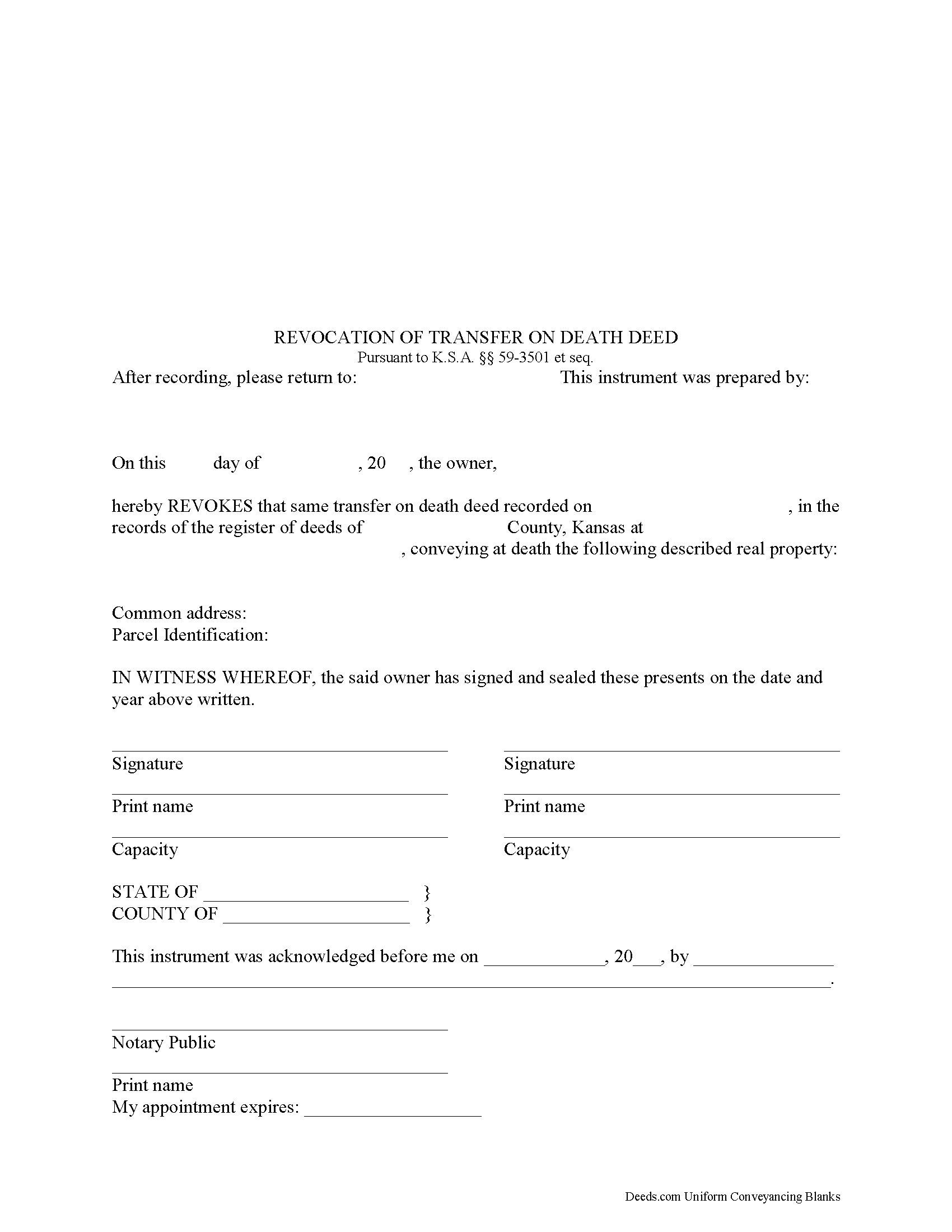
Kansas transfer on death deeds (TODDs) are governed by K.S.A. 59-3501 (2012) et seq. Revocation, specifically, is addressed in.
The transfer on death deed is a flexible estate planning tool which became available to Kansas land owners in 1997. Revocability, one of the many unique features of this deed, is based on the fact that the conveyance has no effect until after the owner dies.
Why might an owner wish to cancel, or revoke, a transfer on death? Sometimes there are changes in the owner or beneficiary's circumstances, unexpected family disputes, or one or more of numerous other reasons. In this regard, the reason does not matter -- the owner holds absolute title to and control over the property. The statute at 59-3503 provides two methods for exercising this option:
(a) A designation of the grantee beneficiary may be revoked at any time prior to the death of the record owner, by executing, acknowledging and recording in the office of the register of deeds in the county where the real estate is located an instrument describing the interest revoking the designation. The signature, consent or agreement of or notice to the grantee beneficiary or beneficiaries is not req... More Information about the Kansas Transfer on Death Deed Revocation
Transfer on Death Affidavit
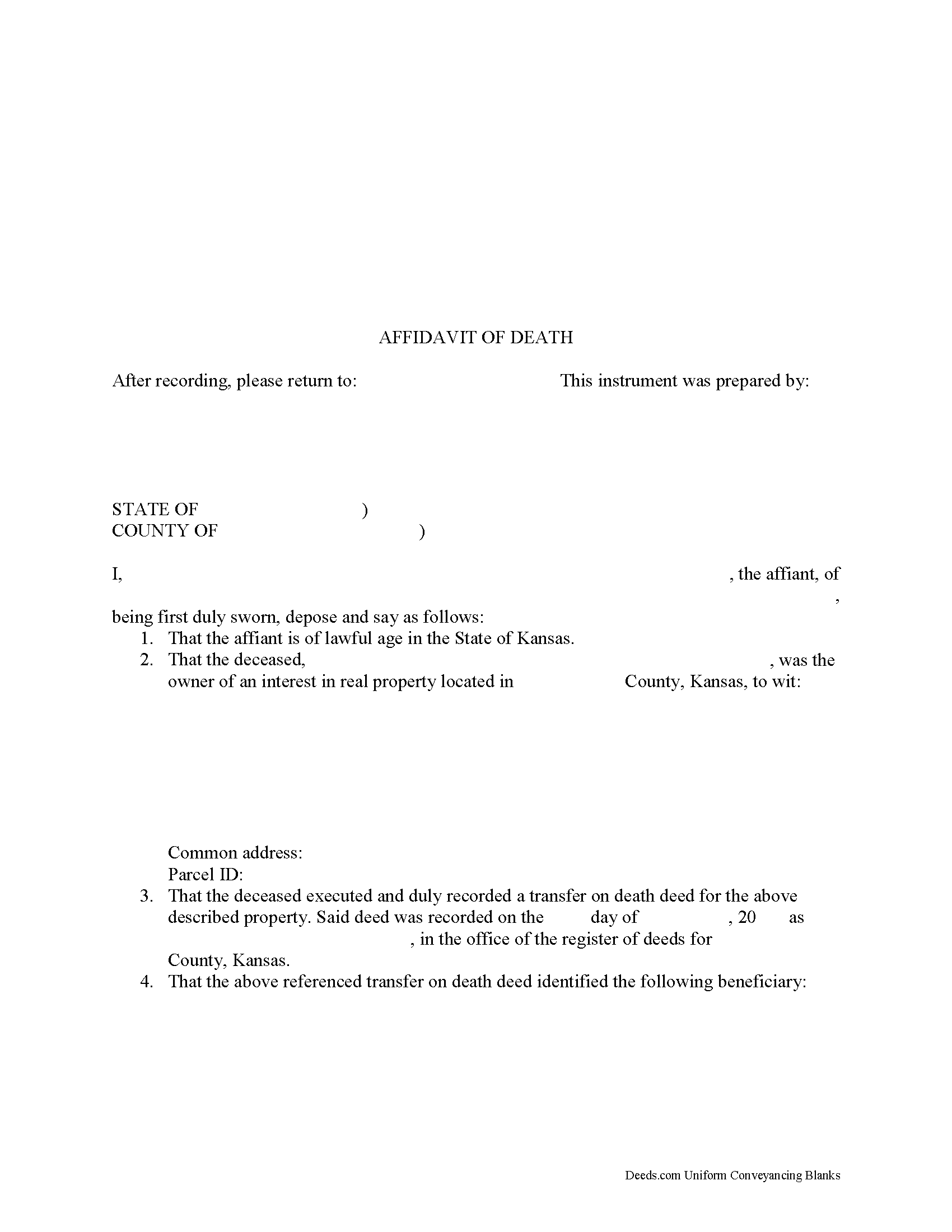
Using a Kansas Affidavit of Death to Complete a Transfer on Death
In Kansas, the county assessor's office initiates the transfer of real property rights under a transfer on death deed. There are several steps to take, however, before that can happen.
When the property owner dies, an individual with personal knowledge of the intended transfer, whether the named beneficiary or someone else, makes the sworn statements contained within an affidavit of death. The affidavit, along with an official copy of the deceased owner's death certificate, is filed for record with the register of deeds for the county where the land is located.
The register of deeds then forwards the details to the county assessor's office, where they match the information on the affidavit with the deed records. After the assessor's office verifies the details, they begin the process to transfer the previous owner's rights to the beneficiary.
(Kansas Transfer on Death Affidavit Package includes form, guidelines, and completed example)... More Information about the Kansas Transfer on Death Affidavit
Trustee Deed
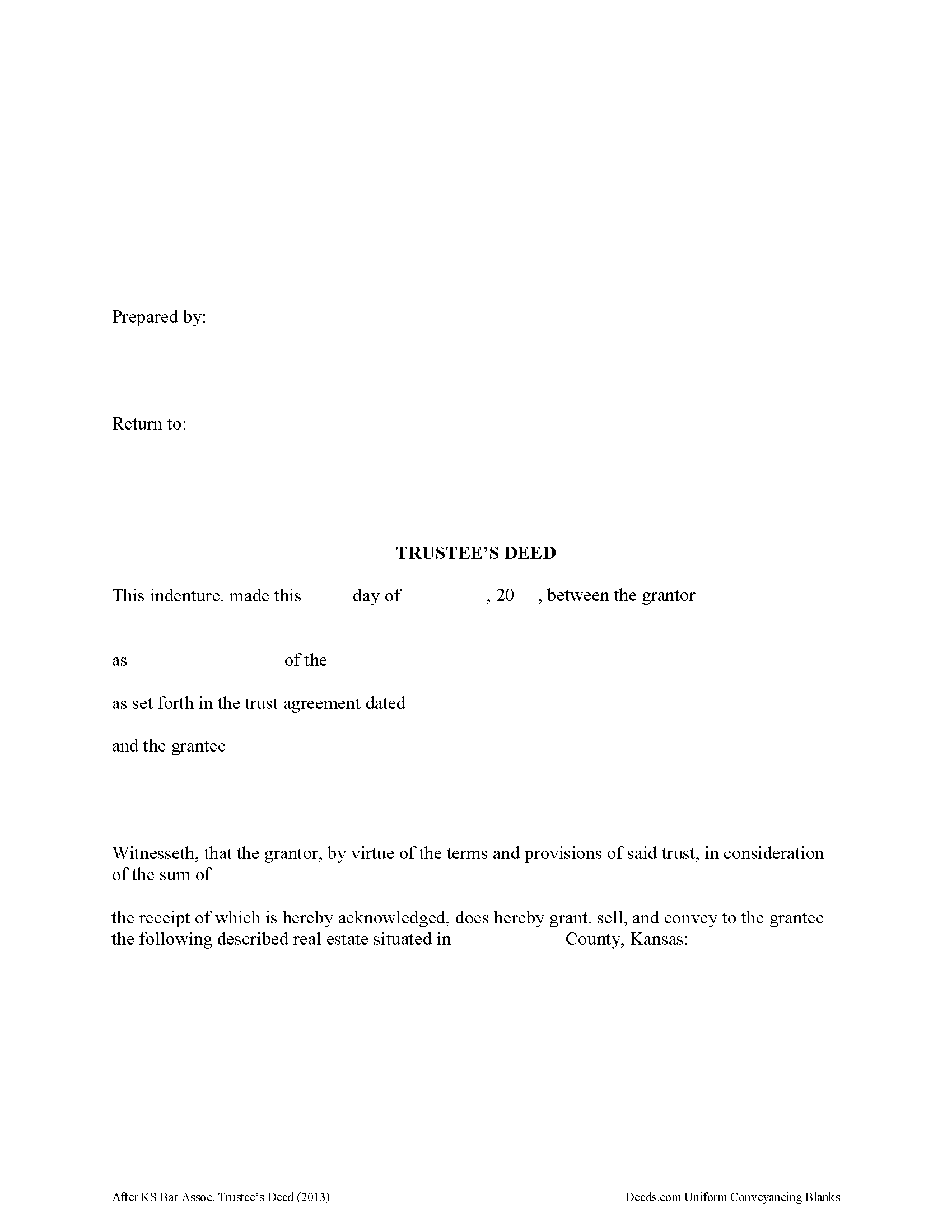
A trustee's deed is used in trust administration to convey real property from a trust. Unlike other real estate deeds, which are named for the type of warranties of title they contain, the trustee's deed is named for the person executing the document.
The trustee is the fiduciary appointed in the trust instrument to represent a trust. Since the trust as an entity cannot hold title to real property, property is transferred to the trust in the name of the trustee-as-representative. The settlor is the person executing the trust instrument and funding the trust with assets.
In a trustee's deed, then, the trustee is the grantor conveying title to the grantee. In Kansas, the trustee's deed is a special warranty deed containing covenants that the grantor defends the title against claims by, through, or under the grantor and grantor's heirs. Further, the deed warrants that the grantor is lawfully seized of the property, has the right to convey the property, and that the property is free from encumbrances, other than those which may be listed in the form. The warranty is limited in that the grantor does not warrant title against those claiming a right, interest, or title that arose pr... More Information about the Kansas Trustee Deed
Administrator Deed
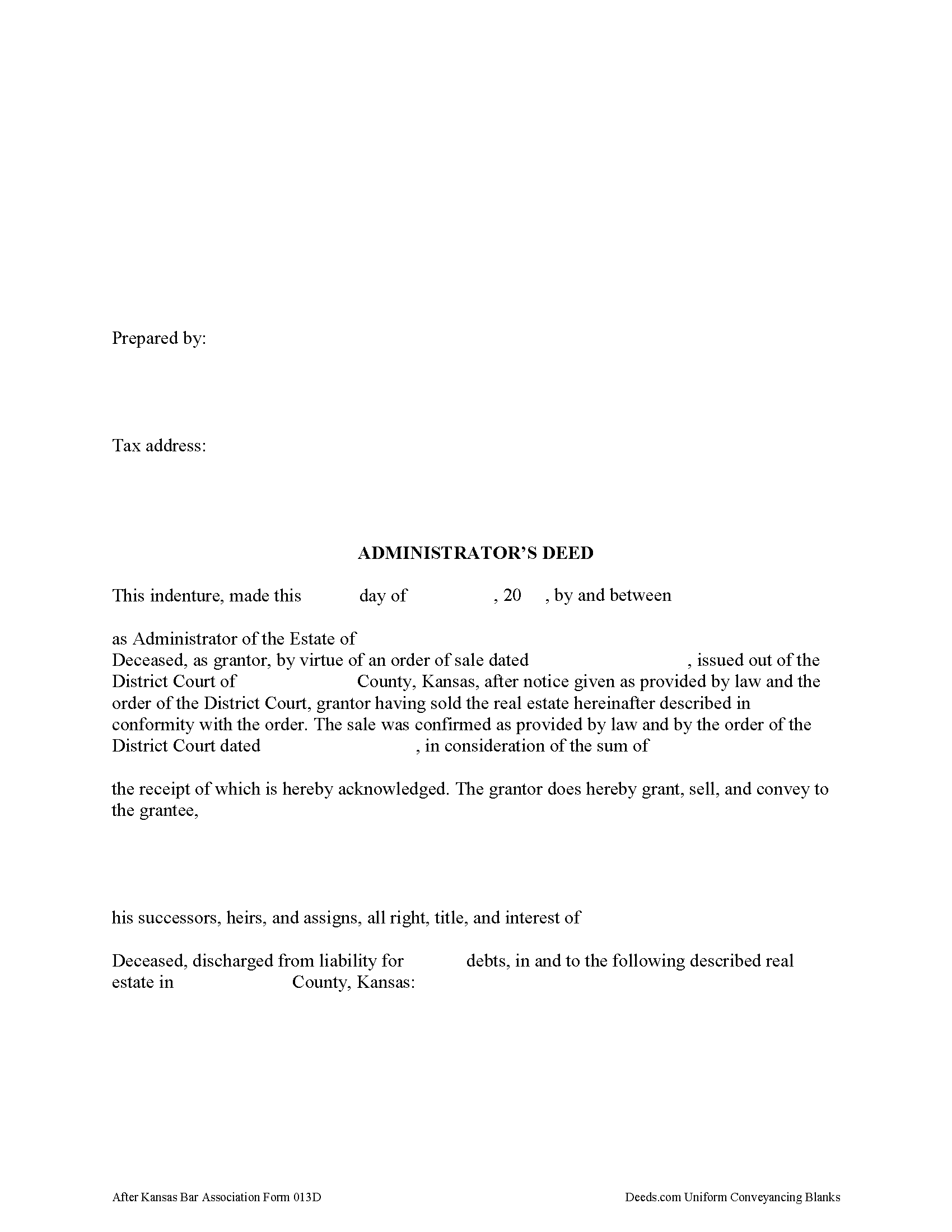
When a decedent dies intestate (without a will), fails to designate a personal representative (PR) in his or her will, or the named PR is unable or unwilling to serve, the court appoints a PR called an administrator.
Use an administrator's deed after the district court has issued an order for sale of the subject real property to convey the property from the estate.
The deed must meet all state and local standards for content and form, and includes a recitation of facts concerning the administrator, the decedent, the order for sale, and the subject property being transferred. The PR signs the completed document in the presence of a notary public prior to recording.
Depending on the nature of the transfer, it may require supplemental documentation. Consult a lawyer with questions about estate administration in Kansas.
(Kansas Administrator Deed Package includes form, guidelines, and completed example)
... More Information about the Kansas Administrator Deed
Executor Deed
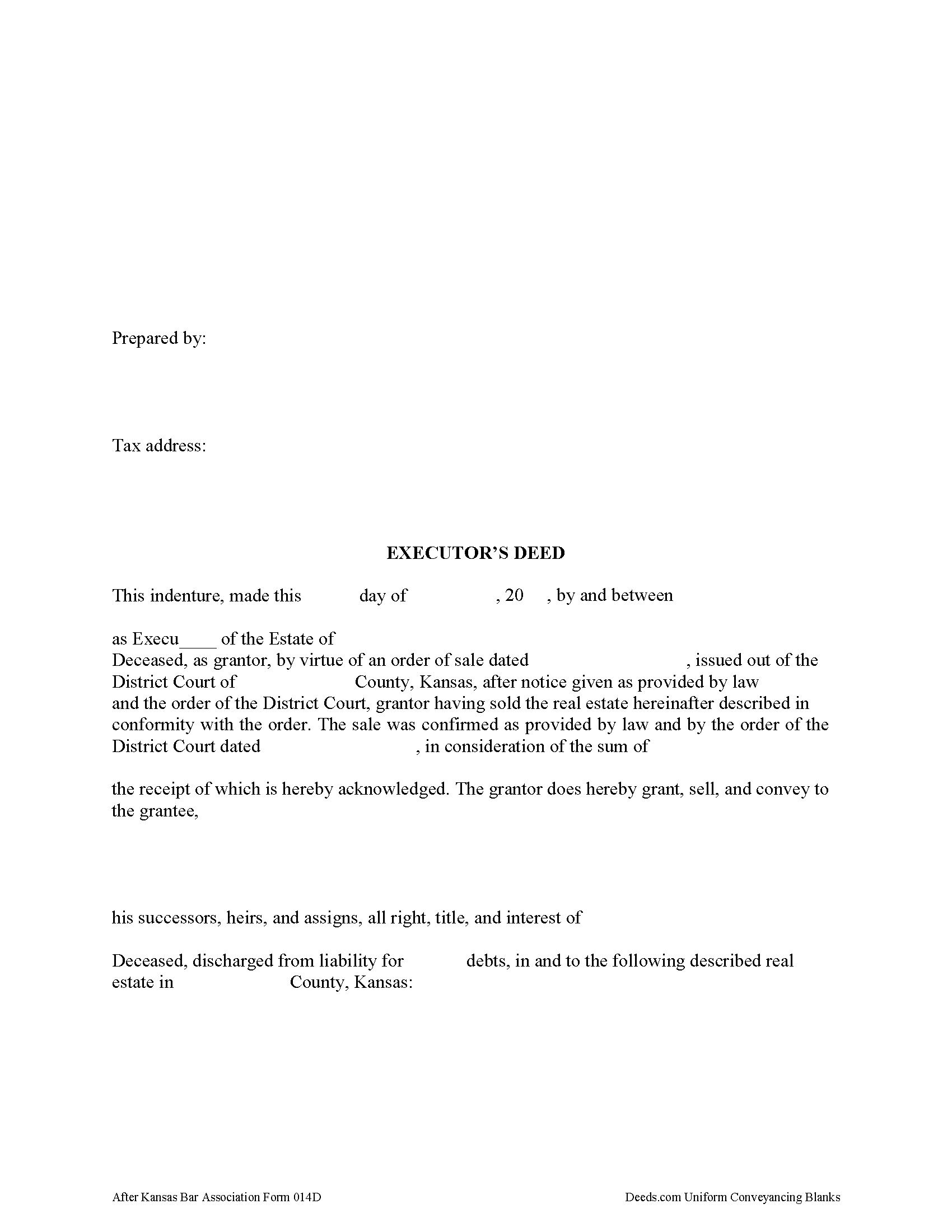
When the decedent dies testate (with a will) naming a personal representative (PR) of his or her estate, the PR is called an executor. An executor may need to sell the decedent's real property to raise money to pay the estate's debts or for other reasons in the best interest of the estate.
If the decedent's will includes a power of sale, a simple executor's deed may be used to convey real property from the estate. The deed requires a recitation of facts concerning the executor, the decedent, and the subject property being transferred, and must be signed in the presence of a notary public and is subject to requirements for conveyances of real property in Kansas.
Supplemental documentation, such as a real estate sales validation questionnaire, may be required, depending on the transfer. Consult a lawyer with questions about estate administration in Kansas.
(Kansas Executor Deed Package includes form, guidelines, and completed example)... More Information about the Kansas Executor Deed
Executor Deed with Power of Sale
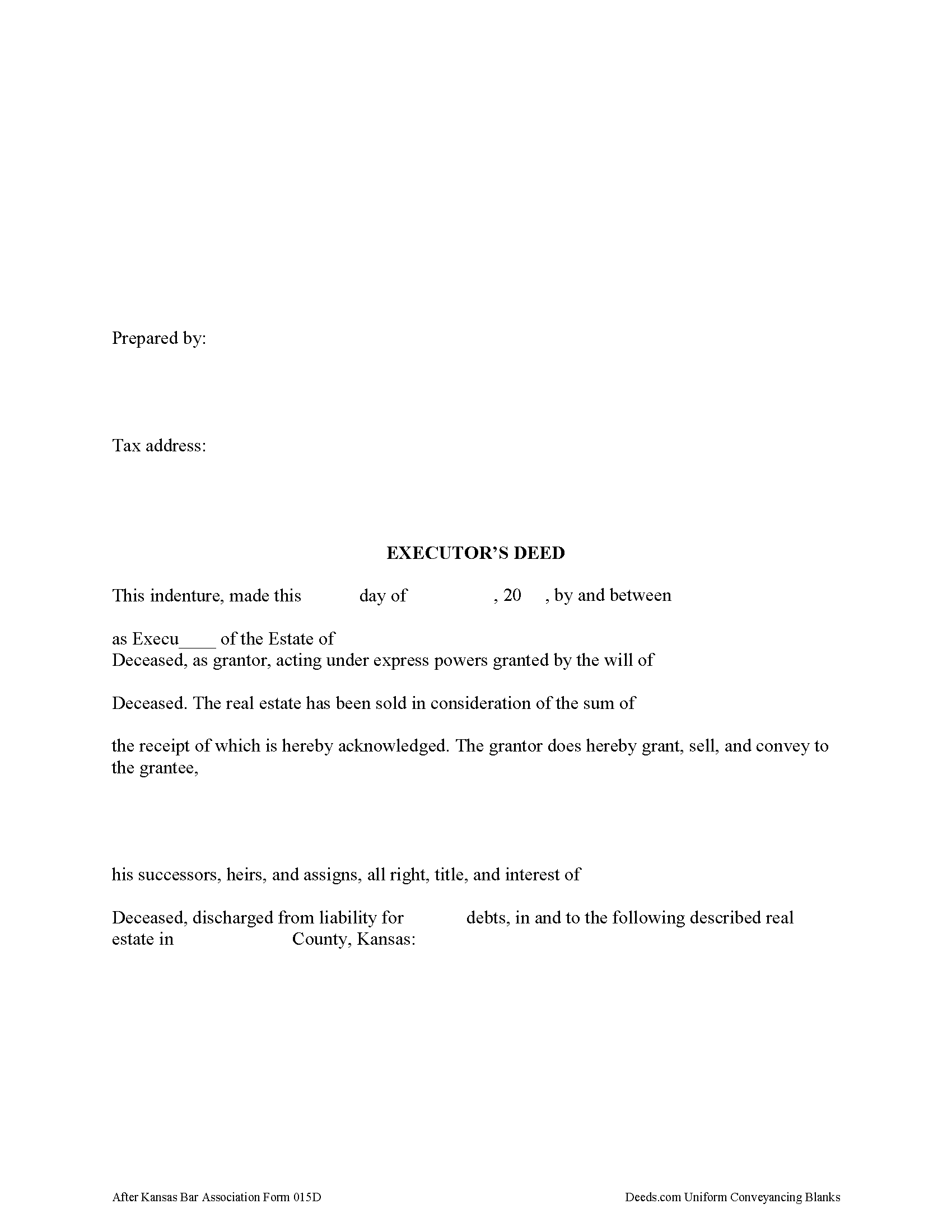
When the decedent dies testate (with a will), naming a personal representative (PR) of his or her estate, the PR is called an executor. An executor may need to sell the decedent's real property to raise money to pay the estate's debts or for other reasons in the best interest of the estate.
An order for sale is required before an executor can transfer real property, unless the decedent's will includes a power of sale.
Use an executor's deed with power of sale after the district court has issued an order for sale to convey real property from the estate. In addition to meeting all state and local standards for conveyances of real property, the deed includes a recitation of facts concerning the executor, the decedent, the order for sale, and the subject property being transferred. The executor signs the completed form in the presence of a notary public prior to recording.
Supplemental documentation may be required, depending on the nature of the transfer. Consult a lawyer with questions about estate administration in Kansas.
(Kansas Executor Deed with POS Package includes form, guidelines, and completed example)... More Information about the Kansas Executor Deed with Power of Sale
Disclaimer of Interest
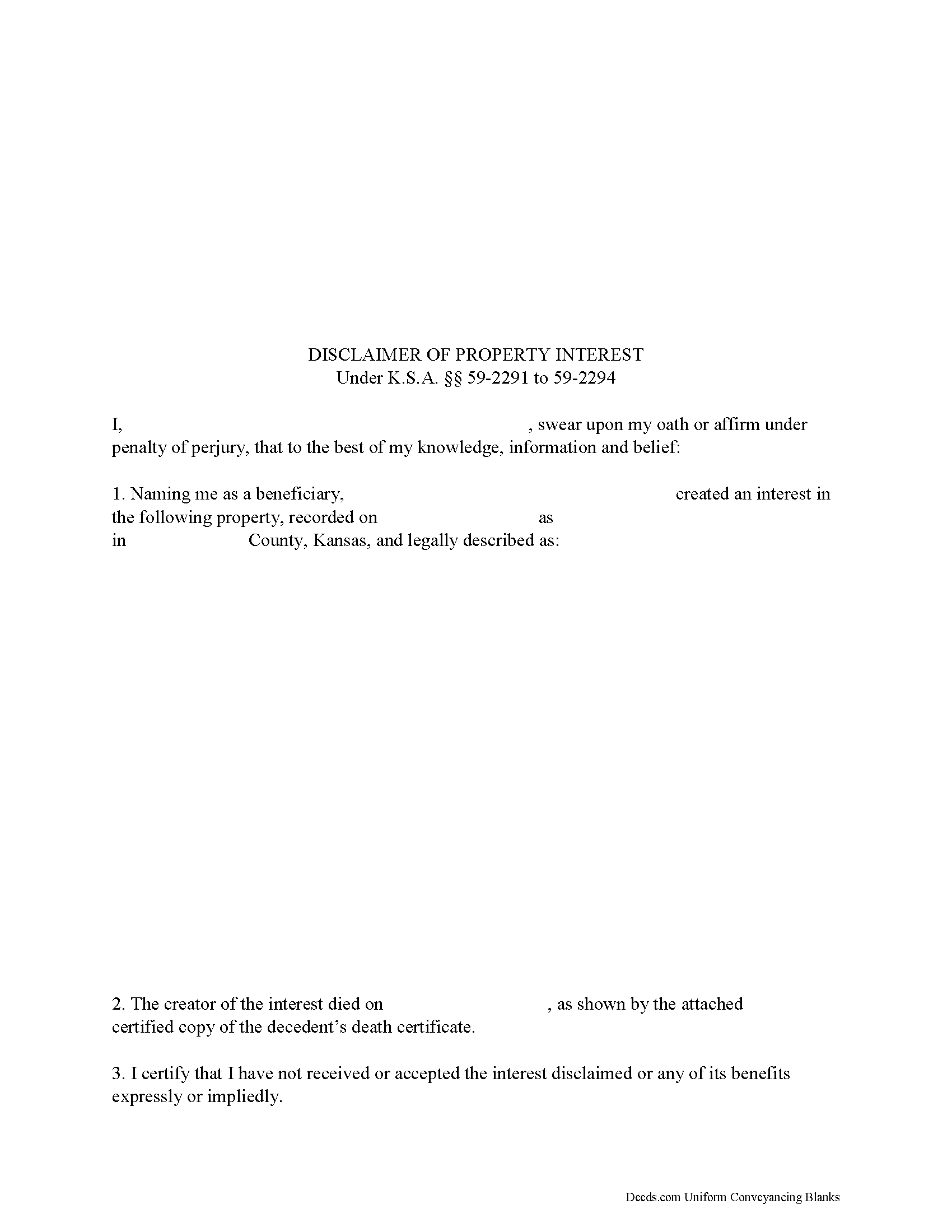
As part of the Kansas Statutes, the beneficiary of an interest in property may renounce the gift, either in part or in full (K.S.A. 59-2291 to 59-2294). Note that the option to disclaim is not available to beneficiaries who have acted in any way to indicate acceptance or ownership of the property (K.S.A. 59-2293 (b)); nor is it available to welfare recipients (K.S.A. 39-709).
The disclaimer must be in writing and include a description of the interest, a declaration of intent to disclaim all or a defined portion of the interest, and be signed by the disclaimant (K.S.A. 59-2291 (b)).
File and record the disclaimer within nine months of the transfer (e.g., the death of the creator of the interest or other qualifying event) in the district court in which the estate of the decedent is or may be administered. Also, deliver, or send by certified mail, a copy of the instrument to the individual who created the interest or to his/her personal representative, or to the holder of legal title to the property (K.S.A. 59-2292). If real property is involved, record a copy with the register of deeds in the county in which the disclaimed property is located in order to avoid any confu... More Information about the Kansas Disclaimer of Interest
Certificate of Trust
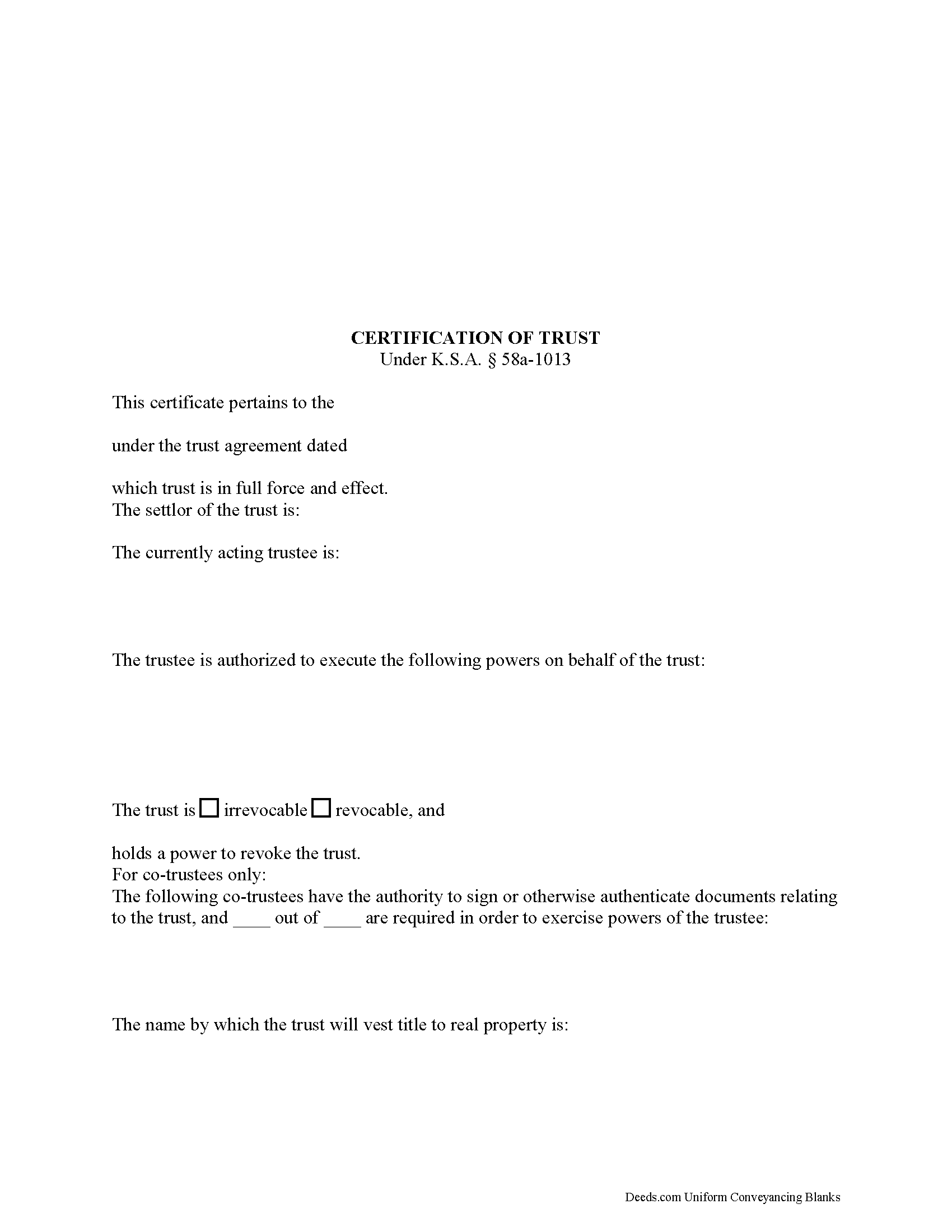
Part of the Kansas Uniform Trust Code, the certification of trust is codified at K.S.A. 58a-1013.
In lieu of the trust instrument, a trustee doing business with a third party who is not a trust beneficiary can provide an acknowledged certification of trust. The certification is an abstract of the trust instrument and contains only information essential to the transaction.
A trust instrument, executed by the trust's settlor, contains the trust provisions. It designates a trustee, or a fiduciary that represents the trust. The trust instrument also identifies the trust beneficiaries, or the person(s) having a present or future interest in the trust (K.S.A. 58a-103(2)(A)).
A certification of trust does not disclose the trust's beneficiaries, or other information a settlor may wish to keep private. In Kansas, only trust instruments pertaining to "the state, or any county, municipality, political or governmental subdivision, or governmental agency of the state as the beneficiary" are required to be recorded (K.S.A. 58-2431, 2).
The document certifies, first and foremost, the existence of the trust and the trustee's authority to represent the trust. The certification also ... More Information about the Kansas Certificate of Trust